The Gaming Issue


CHICAGO’S FREE WEEKLY SINCE 1971 | MAY 28, 2020
CITY LIFE
03 Letter A note from an editor who likes games
FOOD & DRINK
04 Feature Hermosa’s chef makes space on his sandwich menu for the city’s only Khmer food.

ARTS & CULTURE
14 Cybersex The virtual world of Second Life is still a sanctuary for folks leaning into their fantasies.
16 Nintendo What is the appeal of Animal Crossing, the game that’s taking the world by storm?

watch; End of Sentence adds a surprising overlay to a mostly familiar map; and Papicha is banned in Algeria and full of joy and despair.
MUSIC & NIGHTLIFE
24 Galil | Feature Chicago video-game composers talk about how they found their way into this strange and diffi cult business.
34 Early Warnings Rescheduled concerts and other updated listings
Gossip Wolf Chicago jazz guitarist Tim Stine drops an engagingly off-kilter new trio album, a 26-track compilation benefits the staff of the shuttered Crown Liquors, and ESS presents yet another can’t-miss program in its Quarantine Concerts series.

TO CONTACT ANY READER EMPLOYEE, E-MAIL: (FIRST INITIAL)(LAST NAME) @CHICAGOREADER.COM
PUBLISHER TRACY BAIM
IN CHIEF SUJAY KUMAR, KAREN HAWKINS CREATIVE LEAD RACHEL HAWLEY
EDITOR PHILIP MONTORO THEATER AND DANCE EDITOR KERRY REID CULTURE EDITOR BRIANNA WELLEN ASSOCIATE EDITOR JAMIE LUDWIG
SENIOR WRITERS MAYA DUKMASOVA, LEOR GALIL, DEANNA ISAACS, BEN JORAVSKY, MIKE SULA EDITORIAL ASSOCIATE S. NICOLE LANE GRAPHIC DESIGNER AMBER HUFF
LISTINGS COORDINATOR SALEM COLLO-JULIN CONTRIBUTORS ED BLAIR, NOAH BERLATSKY, LUCA CIMARUSTI, MARISSA DE LA CERDA, MARI COHEN, JOSH FLANDERS, SHERI FLANDERS, JACK HELBIG, IRENE HSAIO, CATALINA MARIA JOHNSON, MONICA KENDRICK, STEVE KRAKOW, NOËLLE D. LILLEY,JAMIE LUDWIG, MAX MALLER, ADAM MULLINS-KHATIB, J.R. NELSON, JEFF NICHOLS, MARISSA OBERLANDER, MATTHEW SIGUR, CATEY SULLIVAN
06 Dungeons and Drinks The Chicago Board Game Cafe offers food and drink pairings to go with your new favorite games.
NEWS & POLITICS
08 Joravsky | Politics Imagine if Jordan, not Obama, was the leader of the Democratic Party.

10 Isaacs | Culture Making a federal issue out of the Obama Center lawsuit

12 Influencer From a studio inside his closet, one refugee is using YouTube to broadcast information about coronavirus.
17 Interview In which an elevenyear-old named George takes a break from staring at his computer and answers questions about gaming.
THEATER
18 LARP Theater nerds and gamers unite at Otherworld.
20 Exodus Victory Gardens playwrights ensemble gives notice.

FILM
22 Short Fatimah Asghar’s new short film Got Game explores queer sex with a video-game twist.
23 Movies of note The Lovebirds is a pleasantly breezy at-home
27 Chicagoans of note Thomas Comerford, filmmaker and singersongwriter
28 Shows of note A pandemic can’t stop the flow of great music. Our critics review releases that you can enjoy at home.
32 #ChiMusic35 Ohmme cofounder Sima Cunningham spent years in a children’s choir that sang for the Dalai Lama—and she hopes to help such groups continue nurturing young musicians.
OPINION
Savage Love Dan Savage offers advice to a woman looking to dump her boyfriend now that he’s recovered from coronavirus.
CLASSIFIEDS
Growing up queer with Sims
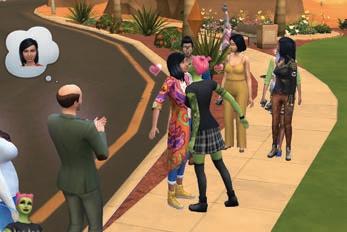
DIRECTOR OF DIGITAL JOHN DUNLEVY SOCIAL MEDIA COORDINATOR JANAYA GREENE STAFF AND SPECIAL PROJECTS ASSISTANT TARYN ALLEN
STRATEGIC INNOVATION DIRECTOR MARIAH NEUROTH DEVELOPMENT DIRECTOR COLETTE WILLARD MEDIA PARTNERSHIPS COORDINATOR YAZMIN DOMINGUEZ
EXECUTIVE ASSISTANT SANDRA L. KLEIN SPECIAL EVENTS CONSULTANT KRISTEN KAZA
ADVERTISING
312-392-2970, ADS@CHICAGOREADER.COM CLASSIFIEDS: CLASSIFIED-ADS@CHICAGOREADER.COM
SALES DIRECTOR PATTI FLYNN VICE PRESIDENT OF SALES AMY MATHENY CLIENT RELATIONSHIP MANAGER TED PIEKARZ SENIOR ACCOUNT REPRESENTATIVES
LENI MANAA-HOPPENWORTH, LISA SOLOMON ACCOUNT REPRESENTATIVES
GREG MCFALL, NANCY SANCHEZ CLASSIFIED SALES MANAGER WILL ROGERS
NATIONAL ADVERTISING VOICE MEDIA GROUP 1-888-278-9866 VMGADVERTISING.COM
JOE LARKIN AND SUE BELAIR
DISTRIBUTION CONCERNS distributionissues@chicagoreader.com 312-392-2970
CHICAGO READER L3C
BOARD PRESIDENT DOROTHY R. LEAVELL TREASURER EILEEN RHODES SECRETARY JESSICA STITES AT-LARGE SLADJANA VUCKOVIC
CONSULTANT CAROL E. BELL
READER (ISSN 1096-6919) IS PUBLISHED WEEKLY BY CHICAGO READER L3C 2930 S. MICHIGAN, SUITE 102 CHICAGO, IL 60616 312-392-2934, CHICAGOREADER.COM
COPYRIGHT © 2020 CHICAGO
PERIODICAL
ALL
PAID AT CHICAGO, IL
2 CHICAGO READER - MAY 28. 2020 ll
34
36
38 Jobs 38 Apartments & Spaces 38 Marketplace THIS WEEK CHICAGO READER | MAY 28, 2020 | VOLUME 49, NUMBER 34
IN THIS ISSUE Emergency moves Is the mayor responsive and collaborative, or dismissive and combative? 14 East tackles isolation The DePaul-based online magazine adapts its annual live storytelling event for quarantine.
“Za Woka Genava” means “I think you are hot” in Simlish, and I think that’s beautiful. THIS WEEK ON CHICAGOREADER.COM ON THE COVER: ILLUSTRATION BY DAVID ALVARADO. FOR MORE OF ALVARADO’S WORK, GO TO HELLO-DAVID.COM
EDITORS
MUSIC
READER
POSTAGE
RIGHTS RESERVED. CHICAGO READER, READER, AND REVERSED R: REGISTERED TRADEMARKS ®
letter from an





















My earliest memory of playing games involves cards. In a cabin in the woods, my grandma Dorothy taught me war (the easiest and most endless game), then gin, cribbage, and most importantly, solitaire. How wild, I thought as a four-year-old, to have a game you can play all by yourself! I was, at the time, an only child, and my only friend was my small black cat, Doodle. Having games to play alone suddenly opened up a whole world of entertainment that filled the void when my cat was sick and tired of our tea parties.


During the first week of quarantine I found myself playing solitaire again, a fitting metaphor for the weeks and months of alone time we were all about to endure. But then I taught a friend to play gin. Other friends added me on an app where we could play cribbage against each other. Then there was the explosion of remote Jackbox games, virtual Dungeon and Dragons campaigns, Zoom trivia—games, it seemed, were allowing me to connect with people more than I ever had before. Cut to a recent Reader Zoom meeting.
Before getting down to business, we check in on each other. What has everyone been up to in these times? Taryn, for one, can’t stop playing Animal Crossing . Nicole has fallen deep into the world of Second Life (and she’s killed her Sims family, well, we’ll just say more than once). Salem is trying to understand the video-game culture a young friend is into, but honestly is more interested in board games from the 80s. Kerry is finally getting a chance to nerd out with the minds behind Otherworld Theatre. Leor is digging into the local musicians who soundtrack the games we play. When we keep defining the “new normal” all day every day, it seems games are the one thing that will always connect us.
As for me, while my grandma Dorothy is no longer with us, I did just days ago attempt a virtual game night with my family. No, Ma, you have to do Google Meet first! Dad, look at your phone, type the answer on your phone! Maddy, you’re frozen! Lil, you have to refresh! Maybe I’ll stick to solitaire after all.


 —CULTURE EDITOR BRIANNA WELLEN
—CULTURE EDITOR BRIANNA WELLEN
MAY 28, 2020 - CHICAGO READER 3 CITY LIFE
editor Our first-ever Gaming Issue Everything I need to know about coping with quarantine I learned from playing solitaire.
DAVID ALVARADO
IMPORTS & DOMESTICS ‘15 Toyota RAV4 Ltd. AWD/Navi. ............Auto., Leather, 12K, Grey, 24225A ....$18,995 ‘19 Toyota Corolla Hatchback XSE/Navi. ....Loaded, 11K, Silver, 22343R ....$17,995 ‘17 Honda CR-V LX AWD ....................Automatic, Full Power, White, 24205A ....$17,995 ‘17 VW Passat 1.8T SE AWD ................Auto., Leather Sunroof, Grey, 6485A ....$14,995 ‘12 Acura TL w/Tech/Navi/ ................Leather, Moonroof, Black, 24284A ....$11,995 ‘13 Hyundai Sante Fe 2.0T AWD .... Automatic, Full Power, Black 23373B ....$11,995 ‘11 Honda CRV EX AWD ..........................Automatic, Sunroof, Silver, 24311A ......$9,995 ‘15 Kia Soul ..............................................Manual, Full Power, Alien2, 21917A ......$8,995 ‘14 Honda Accord LX ..........................Automatic, Full Power, Silver, 23628B ......$8,995 ‘11 Honda Accord LX ............................Automatic, Full Power, 67K, 24134A ......$7,995 ‘17 Hyundai Elantra SE ...................... Automatic, Full Power, Black, 24159 ......$7,995 ‘08 Jeep Grand Cherokee Laredo 4x4 ............Automatic, Beige, 24250A ......$6,995 ‘09 Mini Cooper S ................Automatic, Full Power, 58K, Dark Silver, 24393A ......$6,995 SUBARU FORESTERS ‘17 Forester Prem. ......Automatic Sunroof, Heated Seats, Green, 23852A ....$18,995 ‘16 Forester Touring ............Automatic Sunroof, Leather, Silver, 23651A ....$18,995 ‘17 Forester Ltd. ....................Automatic Sunroof, Leather, Silver, 24102A ....$17,995 ‘16 Forester Prem. ........Automatic, Sunroof, Heated Seats, Red, 24456A ....$16,995 ‘14 Forester Prem. ......Automatic, Sunroof, Heated Seats, White, 24116A ....$13,995 SUBARU OUTBACKS / ASCENT / CROSSTREK ‘19 Ascent .............................. 8 Passenger, Sunroof, Eyesight, 4K, Grey, P6528 ....$25,995 ‘17 Crosstrek Prem. .............................. Automatic, All-Weather, Black, P6469 ....$19,995 ‘17 Outback Prem. Auto., Eyesight, Alloys, Black, 23697A ....$19,995 ‘18 Outback 2.5i ....................Automatic, Full Power, Eyesight, White, P6493 ....$19,995 ‘16 Outback Prem. ................Automatic, All Weather, Alloys, Black, 24117A ....$17,995 ‘14 Outback Prem. Auto., Full Power, Alloys, Silver, P4891 ....$12,995 ‘12 Outback 2.5i Automatic, Full Power, Black, 23880A ......$7,995 EvanstonSubaru.com 3340 OAKTON - SKOKIE • 847-869-5700 A+ RATED TOP-QUALITY INSPECTED USED CARS & SUV’ S *Add tax, title license and $300 doc fee. 0% financing for 63 months. Monthly payment of $15.87 per $1,000 borrowed.Finance on approved credit score Subject to vehicle insurance and availability. Ends 6/2/2020 When A Great Deal Matters, Shop Rob Paddor’s... Voted “Best Auto DeAlership ” By CHICAGO Voters’ Poll 2019 Evanston Subaru in Skokie 0% 0% 0% 0% FORESTER ASCENTOUTBACK IMPREZA 0% 63 MONTHS Monday-Friday Monday-Friday Saturday Saturday 9:00AM-8:00PM 9:00AM-6:00PM STARTING FRIDAY, MAY 29TH OUR SHOWROOM WILL RE-OPEN AND APPOINTMENTS WILL NOT BE REQUIRED FOR SHOPPING OR TEST DRIVES! WELCOME BACK DEALS! GRAND REOPENING Social Distancing & Face Masks will be Required for all Customers and Employees APPOINTMENT REQUIRED NO
FOOD & DRINK
RESTAURANT FEATURE


Ethan Lim leans in to Cambodian food
Hermosa’s chef makes space on his menu for the city’s only Khmer food.
 By MIKE SULA
By MIKE SULA

Unless your mom is Cambodian, it seems like every time there’s an opportunity to eat Khmer food in Chicago, it’s the only opportunity. The first time I wrote about it, way back in 2008, there were no restaurants serving it, but twice a year, with a sincere o ering to the monks of Uptown’s Watt Khmer Metta on Cambodian New Year, or Ancestors’ Day, you could join in a post-ceremonial feast of outstanding food made by a lot of moms.

Four years ago, Lombard’s Angkor Restaurant was a bright star that burned out too fast. But not long before that, almost five years to the day, Ethan Lim planted the seeds of what’s promising to be an institution for Khmer food in Chicago. About six months ago, I wrote about Lim and his tiny, terrific Hermosa snack shop, where he was practicing sandwich sorcery, putting iconic, and increasingly Southeast Asian, dishes between buns, which started getting a lot more attention than the dogs and burgers he started with.
In November, Lim’s sister had a few Khmer noodle soups and curries on her menu at the adjoining pan-Asian Googoo’s Table. Meanwhile he was promising Cambodian food pop-ups
in Hermosa, and with the uncompromising December sandwich prahok ktiss, based on the quintessential Khmer dish of pork belly gilded with the fermented mudfish paste kroeung, it seemed he’d planted a flag.
Then came COVID-19, and pop-ups in his tiny dining and ordering area no longer make much sense. And yet Lim is pushing forward with a new menu, “Cambodian to Go,” offering both a la carte dishes and meal sets—“the way my family would eat”—initially for pickup and soon for delivery through Tock. The outstanding Cambodian fried chicken sandwich remains, but he 86’d two others to make it happen. Gone are the bu alo chicken and chicken parm—to make room for mee kula, a dish that comes from the Kula minority group in western Cambodia. Rice noodles tossed with pickled cucumbers, crunchy bean sprouts, preserved radish bits, crushed peanuts, and the light marine funk of dried shrimp powder and fish sauce, it hits a dozen pleasure points at once. Nom bachok is a soupier rice noodle dish with whitefish, built on a broth seasoned with kroeung, coconut, and swimming with banana blossoms and herbs, while a seem-
4 CHICAGO READER - MAY 28, 2020 ll
MONEY+ POWER Visit ChiUL.org/moneyandpower
ingly simple and comforting congee is a riot of flavors and textures when you dose the hot rice porridge with chicken floss, fried garlic, salted soybeans, and sambal, along with cilantro, culantro, scallions, and ginger. He’s perfecting his fried banana recipe for dessert.
One afternoon last week a masked Lim showed up at my door like the ninja Kakashi Hatake, bearing a prototype meal kit containing the congee, mee kula, and a salad of sweet, delicate head-on grilled shrimp, crushed peanuts, herbs, cucumbers, and fried shallots. The centerpiece tek prahok sach ko was a nod to French Indochina that Lim calls “Cambodian steak frites,” a perfectly rare sliced ribeye, with a bag of Lim’s crackly battered fries, the ideally durable spud variant to survive the length of a delivery order. These are to be dunked in a deadly rich garlic aioli balanced by a little tub of powerful tek prahok for the steak; a dipping sauce of kroeung, roasted fish paste, and lime juice, incorporated with green Thai eggplants, and “all the herbs you can imagine.”
Lim has converted his western-facing dining area into sort of a greenhouse for those herbs— Vietnamese coriander, Thai basil, lemongrass, ginger, cilantro, culantro, and amazingly, a jackfruit plant he started from a pit. Meanwhile a friend is showcasing kokodama—Japanese
moss-mounted ornamental plants, while another, Anthony Scardino, aka Professor Pizza, has been holding down a residency on Fridays and Saturdays.
















































Lim plans to rotate in new dishes, all part of his long-running scheme to introduce customers to the food he grew up eating, and comfort those who grew up eating it too. One such crowdpleaser is his mom’s kaw daan, the peppery soy-braised pork belly and egg dish she made regularly for family meals in the family restaurant.

Lim gave the Reader the recipe for this special dish, and it’s one of 80 featured in our new cookbook, Reader Recipes: Chicago Cooks and Drinks at Home , released this week and benefitting the Reader and the Comp Tab Relief Fund for hospitality workers. Lim is joined by a Murderers’ Row of Chicago chefs and bartenders who contributed—Bayless, Kahan, Izard, Cikowski, Zaragoza, Steuer, Williams, and many more.











































You can buy the cookbook on the Reader’s website, but if you don’t feel like braising Momma Lim’s pork belly for a few hours, her son is donating proceeds from any orders he gets for the kaw daan to Comp Tab himself. v




































































































MAY 28, 2020 - CHICAGO READER 5 R HERMOSA | $ 4356 W. Armitage 872 802 4920 hermosarestaurant.com FOOD & DRINK
Le : Mee kula , a dish from the Kula people of western Cambodia. Above: Ethan Lim and the burgeoning herb garden at Hermosa. COURTESY ETHAN LIM
@MikeSula ENJOY RESPONSIBLY © 2020 Virtue Cider, Fennville, MI 49408 FROM OUR FARM TO YOUR DOOR VIRTUE, IT’S AT OUR CORE VIRTUECIDER.COM TO ORDER
GAMING
 By BRIANNA WELLEN
By BRIANNA WELLEN
Eric Garneau keeps playing Pandemic Legacy. And as the director of games and retail at the Chicago Board Game Cafe, he has access to more games than most. “I know it sounds kind of morbid, but it feels like a way to have some sort of modicum of control over everything.”
Like many other small businesses and restaurants, the Chicago Board Game Cafe was thrown for a loop when coronavirus caused the city to shut down—the last day they offered dine-in service was March 14, exactly one month after the cafe’s grand opening. Since then, they, like most, have had to pivot to pickup and delivery options to make ends meet. But to keep the experience of the brick and mortar alive for diners at home, they o er games along with their meals.
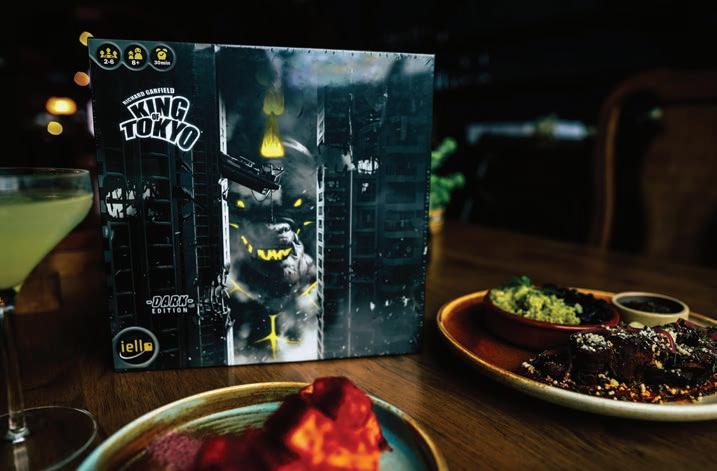
“I feel like especially if you’re quarantined with other people right now, there’s a way in which board games are an escape, but they also forge these connections and make them better, maybe even with people you’re kind of tired of being around,” Garneau says.


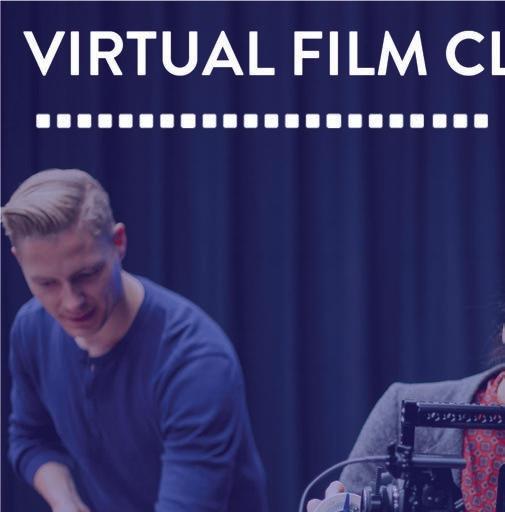
“They let you step outside of this day-to-day existence and do something interesting and imaginative together.”
And diners shouldn’t feel anxious if they’re unsure about how to play the game they ordered—included in the package is a text-in number to ask questions. One of the Board Game Cafe teachers will then either text back or set up a Google Meet session to make sure folks are fully ready to play, just another way they’re keeping their staff employed. Not to mention, each game can be ordered with something o the cafe’s food and drink menu. The physical space was designed with the menu in mind to attract all kinds of crowds and introduce them to the sometimes insular, not-as-scary-or-nerdy-as-it-sounds world of games. Instead of regular bar food like chicken wings or pizza, the menu is made up of higher-end, international dishes. Garneau’s go-tos are the Greyhound cocktail and the pork huaraches. (“I’d eat it every day if I could—which I guess I can actually,” he says, realizing in the moment the enticing possibility.)
6 CHICAGO READER - MAY 28, 2020 ll FOOD & DRINK
Try King Tokyo: Dark Edition with the house beef jerky. COURTESY CHICAGO BOARD GAME CAFE
Wine, cheese, and DecryptoThe Chicago Board Game Cafe offers food and drink pairings to go with your new favorite games.
SUPPORT ANDERSONVILLE BUSINESSES TODAY & IN THE DAYS TO COME andersonville.org/updates Find hundreds of Reader-recommended restaurants at chicagoreader.com/food.
While we can’t yet gather inside the cafe, Garneau passed along suggestions for game and food and drink pairings to recreate the magic in your own living room, dining room, kitchen, or wherever you choose to settle these days. “We think really hard about presenting a full, good experience; even though people are at home we don’t want them to feel slighted,” Garneau says. “We still want it to be a good time for people.”
Garneau’s recipes for gaming success:
Dungeons & Dragons Starter Set
Some folks are taking advantage of this extended time at home to dive into hobbies they’ve always been curious about. For us, one of our favorites is Dungeons & Dragons , the world’s longest-running and best roleplaying game. This starter set gives you everything you need for three to six people to start playing, including premade characters, a great adventure (that fans of The Adventure Zone podcast will recognize), and even dice—and it’s an absolute steal at $19.99. We recommend pairing this with our bun ga, which has kind of become our signature item. It’s a Vietnamese rice noodle dish with crispy chicken hindquarter. D&D is all about adventures and traveling, and this dish was inspired by our culinary team’s world travels, so it’s a great fit!
Exploding Kittens

One of our best sellers during this time has been this fast-paced card game that combines Old Maid-style play with the artwork and attitude of The Oatmeal webcomic. This game is great for families or folks looking for something simple; it’s one of our breeziest o erings but is also super replayable. Pair with a bag of pho ga popcorn (tossed with chicken skin, pho spice, lime, and chile) and our grapefruit soda
mocktail kit for a nice all-ages afternoon of gaming.

Tak
This two-player abstract strategy game will tickle the same parts of your brain as chess but plays totally di erently. Fantasy fans will recognize this game from Patrick Rothfuss’s Kingkiller Chronicle novels. It’s absolutely perfect for a date night in. We recommend pairing with other items on our menu that combine food and activities . . . our takeand-bake chocolate chip cookies have been super popular lately, as have our cocktail kits (I can’t say enough good things about our Greyhound).
King of Tokyo: Dark Edition
This is a brand-new, limited-release update of one of our favorite games, which combines Godzilla-themed action with Yahtzee -style play, making it another great choice for families. Given the “dark” theme of this special edition, we recommend pairing with food and drink that share a similar palette—Samuel Smith’s Oatmeal Stout is one of our favorite dark beers, and the house beef jerky comes in a sharable bag for four!
Decrypto



This is a team vs. team word-guessing game that we’re all enamored with. You’ll never feel more like a classy spy (unless you are actually a spy). This game was designed in France, and we think it’s fun to pair with other French delicacies, like our special cheese and charcuterie kit made in tandem with wholesaler Regalis Chicago (this stuff is usually not available direct to consumers) and our Robert Sinskey Pinot Gris, a fantastic dessert wine. v
 @BriannaWellen
@BriannaWellen
MAY 28, 2020 - CHICAGO READER 7
FOOD & DRINK
Exploding Kittens pairs nicely with a grapefruit soda mocktail kit. COURTESY CHICAGO BOARD GAME CAFE
POLITICS
Be like Mike
Imagine if Jordan, not Obama, was the leader of the Democratic Party.
By BEN JORAVSKY
NEWS & POLITICS P



resident Obama finally got around to criticizing Donald Trump for his incompetence and idiocy in the face of the pandemic.
Don’t worry—you’re excused if you missed Obama’s criticism, which came in a national commencement address to college graduates.
Classic Obama. It was well written—“this pandemic has fully finally torn back the curtain on the idea that so many of the folks in charge know what they’re doing—a lot of them aren’t even pretending to be in charge.”
But it wasn’t blistering, forceful, or memorable. Obama didn’t even mention Trump’s name. As though it was beneath him to name the blundering nitwit who’s driving the country to ruin.
It’s got me thinking: What if the leader of the Democratic Party—the man most beloved by Democrats—were less like Obama and more like Mike? As in, Michael Jordan.

I’ve got Jordan on my brain these days after having just watched all ten episodes of The Last Dance, which I liked so much, I may watch it again. I know: help is needed.
Back to the Jordan / Obama analogy.
I realize politics is not Jordan’s thing. And that he’s a little, oh, cautious about getting political. Republicans buying sneakers and all that.
But follow me nonetheless.
When it comes to competition, Jordan never lets a grudge—any grudge—go to waste. He views every slight, no matter how trivial or unintended, as a monumental insult that demands revenge.
In contrast, Obama seems to hold no grudges. I’m not sure he even knows what the word means.
I remember him giving former downstate Congressman Aaron Schock a ride back to D.C. on Air Force One—trying to win his vote for
8 CHICAGO READER - MAY 28, 2020 ll
Move over, Obama, and let’s have Mike take the lead in the Democratic Party for a spell.
PETE SOUZA
the stimulus bill back in 2009.
Schock didn’t vote for it.
Jordan would have billed Schock for flying on the plane.
But, Obama? Hey, man, it’s good. Can’t we all get along? Obama kept pretending there was a bipartisan bone in the Republican body up until the day that Mitch McConnell wouldn’t even give Merrick Garland a hearing on the vacant Supreme Court seat.
Now, imagine if McConnell had blocked Jordan’s nominees. Man, Jordan would have cut o all federal aid to Kentucky right there and then. Fuck ’em—those dumbasses aren’t going to vote Democratic anyway.
Now, I’m not saying Jordan would be doing the right thing in this scenario. Just suggesting that Democrats be a little less eager to please as they head into this year’s election.
If nothing else this presidential race will be a referendum on two schools of politics. The scorch-the-earth strategy of Republicans, which has worked well for them. It won them the White House, a majority of Supreme Court justices, and the Senate—even though Trump got fewer votes than Hillary Clinton in 2016.
And the kumbaya—when they go low, we go high—strategy of Obama. Hence, subtlety and nuance as opposed to hitting the public over the head with a two-by-four. That strategy has worked out well for Obama—not so well for everyone else.
Consider these recent events: as the nation’s COVID-19 death toll mounted toward 100,000, Trump tweeted or retweeted an endless stream of hate and bilge at various Democrats, calling them skanks, making fun of their weight, their age. You know, typical Trump stu .
Meanwhile, Trump and his backers act hurt and o ended by Joe Biden’s “you ain’t Black” comment to Charlamagne tha God on The Breakfast Club radio show.
Nikki Haley—Trump’s former UN ambassador—tweeted that Biden’s comments were “gut-wrenchingly condescending.”
Nikki, Nikki, Nikki. I’ll believe you’re offended by bigotry and hate when I hear you denounce the MAGA-hat crowd protesting stay-at-home orders with their confederate flags, rifles, and signs with swastikas and Nazi slogans.
It’s like the Tara Reade thing all over again. Republicans were outraged that Democrats
weren’t more outraged when Reade accused Biden of sexual assault. But not one Republican seems outraged at Trump for allegedly raping E. Jean Carroll.
Apparently, Republicans are OK with rape so long as it’s President Trump who’s doing the raping—allegedly. Just as they apparently have no problem with Nazis, so long as they vote for Trump.
Look, Charlamagne tha God was correct to hold Biden accountable for his commitments to Black communities. (And again, Biden: pick a Black woman as your running mate! We don’t need a female version of Tim Kaine.)
But when it comes to winning over Black voters, the Republican strategy goes like this: shower adulation on the handful of Black commentators or celebrities who support Trump.
And then do everything possible to keep as many Black people as they can from voting, knowing that Black voters have the power to win Wisconsin, Michigan, Florida, and other swing states for Biden.

That suppression includes knocking thousands of Black voters from the rolls, closing polling places in Black neighborhoods, and throwing Black people into jail for trying to vote—as Republican prosecutors did in North Carolina.
Just last weekend a federal judge ruled against Republican officials in Florida who were trying to keep felons—many of whom are Black or Latino—from voting without paying what amounts to a poll tax.
Nikki Haley and the Republicans are awfully quiet about suppressing the Black vote. That’s because they know it’s really the only way they can reelect Trump.
I wish President Obama, Biden, and other Dems would shout from the rooftops about the voting-rights injustices in Florida, North Carolina, and other Republican states. But that’s not their style.
I can think of one Democrat who knows how to beat Republicans—Illinois house speaker Michael Madigan. He’s a little Jordanesque, in his own way—never forgets a grudge, always goes for the jugular. He’ll kick your ass and then carve up an apple as his reward—like Jordan lighting up a victory cigar.
Now there’s a political Mike for Dems to be like.
Remember, Dems, the second-place finishers don’t win championship rings. And the runner-ups don’t nominate Supreme Court justices. v
MAY 28, 2020 - CHICAGO READER 9 NEWS & POLITICS
@bennyjshow
Important Reader

CULTURE


Obama Center still in limbo


A










































 By DEANNA ISAACS
By DEANNA ISAACS






There were some surprises at the latest Obama Presidential Center (OPC) court hearing last week, none odder than the fact that four years after President Barack and Michelle Obama announced Chicago as the site for what was then known as the Obama Presidential Library, we’re still futzing around
where it should sit—dithering over technicalities like whether Jackson Park was ever submerged land while, at the same time, waging a life-and-death battle with a Darwinian pandemic under the surreal

leadership of an unhinged egomaniac.
Thanks to the pandemic, this hearing, before a three-judge federal appeals court panel, took place in part via telephone. It was recorded, which means you can still listen in, on the Court of Appeals for the Seventh Circuit website. If you do, you’ll catch University of Chicago (and NYU) law professor Richard Epstein asking for a reversal of last year’s decision by District Court judge John Robert Blakey to dismiss a lawsuit filed by the activist group Protect Our Parks that sought to keep the Obama Presidential Center out of Jackson Park. And you’ll hear city attorney Benna Ruth Solomon, on the other side, arguing that

10 CHICAGO READER - MAY 28, 2020 ll NEWS & POLITICS
federal appeals court requests another round of briefs.
with court hearings about
national
Due to business closings and for safety purposes, the Chicago Reader is going biweekly with a print run to 600+ locations, including our box route. On the o� weeks (June 4, June 18) the Reader is just being distributed as a free PDF, with a small press run to fulfill subscriber and library mailings. We are also making a limited number of copies available for special short-term subscriptions, 12 weeks for $50, and every week’s issue will be mailed to your home. Just a few hundred copies will be sold of these very limited souvenir editions of the Reader: secure.actblue.com/donate/chicago-reader-print-12
News Thank you, The Reader team Find the full curated PDF download of the Reader at by Wednesday each week. chicagoreader.com/issues
Judge Blakey did everything right and no further court action is necessary.
According to Epstein, the dismissal rested on two incorrect assumptions: that the city and park district have no fiduciary responsibilities in turning Jackson Park land over to the Obama Foundation; and that any responsibility they could have had was satisfied by showing that the Obama Center will o er the public any benefit at all.
It’s complicated, but Epstein’s arguments include these: the city improperly turned over its decision-making authority to the Obama Foundation; the city’s “use agreement” with the foundation is actually an exclusive lease; and the Obama Center is no longer a library, since the presidential papers will be digitized and maintained elsewhere by the federal government. Epstein also disputes the city’s claim that the OPC will take up only 3.5 percent of Jackson Park, arguing that the center’s nearly 20 acres represent a much larger portion of the park’s usable land (since so much of it is occupied by lagoons and roads). He claims that land worth about $200 million is being handed over to the OPC for $10 for 99 years, and that if you add the expense of roadwork and other infrastructure that the project will require, you’ve got about a half-billion-dollar cost to the public.



Solomon, in turn, argues that the Illinois Museum Act allows for presidential libraries in parks; that the OPC will o er many public benefits; and that Jackson Park will remain a park after the OPC is built. She says nonsubmerged land, like Jackson Park, requires only legislative authorization for transfer.
When presiding Judge Amy Coney Barrett asks Solomon (as she had also asked Epstein) to address the question of whether this case belongs in federal court, the city attorney replies unequivocally that both the city and the district court judge have agreed that “there is standing.” In addition, she says, “We would stress the vital public interest in enabling the city to move forward on this important public project, free of the cloud of litigation. There just is no reason to send [the case] to the state court at this late date.”
But, in spite of the fact that neither the city nor Protect Our Parks are questioning whether the federal court has jurisdiction, the judges seem to be focused on it, raising the issue repeatedly, commenting that claims like this can be pursued in state court, and complain-
ing that “it feels like we’re sitting as a zoning board.” A listener who doesn’t know better might be tempted to think that they’re looking for a way to hand it o .

The final minutes of the oral arguments o er another surprise. During Epstein’s brief rebuttal, he’s asked this: “Would the plainti s’ analysis di er if the OPC was placed in Washington Park and not Jackson Park?” To which he responds, “We would not have bothered to bring suit.”
Really? A 20-acre complex with a 235-foot tower in Washington Park would be OK?
Protect Our Parks clarified after the hearing that Epstein was referring to the Washington Park neighborhood, not Washington Park itself.
Judge Barrett concluded the 43-minute hearing by announcing that the case would be taken “under advisement.” Within hours, however, the court issued a demand for a new set of briefs on the question of whether this lawsuit should be in federal court at all. The deadline for those briefs is June 4. v
 @DeannaIsaacs
@DeannaIsaacs
MAY 28, 2020 - CHICAGO READER 11
Rendering of the proposed Obama Presidential Center museum building COURTESY OPC
NEWS & POLITICS MAY 30 Sophia Lucia’s Freak Show Cabaret (EVENT REPEATS WEEKLY) @ OnlineSAT JUNE 6 Naperville Soulfest 2020 @ Naperville SettlementSAT JUNE 6 Purpose & Passion Tour 2020 @ Online, Eboni Montsho IgnitesSAT to add your event to TIXREADER.COM and see it listed here weekly, please send an email to mroeder@chicagoreader.com
INFLUENCER
‘Please stay at home’
From a studio inside his closet, one refugee is using YouTube to broadcast information about coronavirus.
By CLARISSA DONNELLY-DEROVEN
Emma Yaaka snaps his fingers to make sure his audience is listening. He wears a chartreuse polo shirt and AirPods as he speaks into the camera. “Please, whenever you cough,” he says as he fake coughs into his fi st, “cover your mouth.” He pauses for emphasis between each word and ru es through some papers on his desk. He holds up a picture of himself, partially disguised in a baseball hat, with a tissue over his nose. “COVID-19” is typed across his forearm. A banner at the top of the page reads “COVER YOUR COUGHS AND SNEEZES.” “Please do this,” he says.

Yaaka is a medical case manager for refugees at Heartland Alliance. He brings refugees to doctor’s appointments, translates for them, and makes sure clients with chronic illnesses know how to manage their conditions. But after 5 PM on weekdays and on weekends, he sits inside of his closet fi lming videos for his YouTube channel WordOut. He addresses the camera with the same intensity I imagine he uses when speaking to clients. His purpose is the same: he wants to give refugees the information they need.
Yaaka started uploading videos to his channel on April 14, when Illinois had recorded 23,247 coronavirus infections and 868 deaths. In some videos, Yaaka quotes information about the disease from the Centers for Disease Control and Prevention and the World Health Organization. In others, he interviews experts who give practical advice to refugees on how they can protect themselves. Nothing Yaaka says in his videos is new. While the facts and fi gures are widely available across the Internet, his perspective is not. What matters is that the information is coming out of his mouth. Yaaka is a fellow refugee, and he speaks to his viewers with compassion, from a place of deep knowing.
“Being that we [as refugees] have limited families around us, visiting our friends, visiting other people around the community where we are living, it is so essential,” he says in one video. “But at this point we are encouraging all refugees and immigrants to make sure to please stay at home.”
Yaaka was born in the Manafwa district of eastern Uganda in 1992. He fl ed violence in his household as a teenager. After years hid-
ing in Uganda, Yaaka arrived at the Kenyan border in 2015 at the age of 23. He befriended a truck driver whom he convinced to smuggle him across the border. Yaaka arrived in the capital city of Nairobi confused and alone. He wandered until he came upon a group of people sleeping on the streets. He soon realized they were refugees waiting to register with the United Nations High Commission for Refugees, or UNHCR. He had learned about refugees in school, but never imagined that one day he would become one. He got in line too.
Four months into his stay in Nairobi, as he waited for his application to process, humanitarian aid agencies in the city announced they were looking for two refugees, one Ugandan and one Congolese, to help connect other urban refugees with medical services. Refugees in Kenya are legally only allowed to live in refugee camps. But the UNHCR estimates that about 16 percent of Kenya’s refugee population live in urban areas. Agencies in these urban centers have limited resources, so they often enlist qualifi ed refugees to serve as case managers in exchange for a small living stipend.
As a Ugandan fluent in four languages and certified as an EMT and in first aid, Yaaka got the job. In his new position, he’d visit around 100 refugees at home every month and distribute medication, condoms, and clean water tablets to those who couldn’t a ord them; connect those who had trouble with the Kenyan police (who have a documented history of abuse) with legal services; and translate for refugees at medical appointments. If a refugee arrived in Nairobi without a place to stay, Yaaka would invite them to stay in his home until they found their bearings.
In July 2017, the U.S. approved Yaaka’s resettlement application. He made his way across the Atlantic to a small studio in Rogers Park where light poured in through the windows. His resettlement agency, Heartland Alliance, fi rst got him a job on the janitorial sta at a hospital in Evanston. As he emptied the trash in one of the labs, he began speaking with the researchers. He relayed stories of his work in Nairobi and all the certifi cations he’d racked up in lieu of a formal degree. He joined the lab until he became a medical case manager for Heartland.
Yaaka and his friend Tracey Morrison (who edits WordOut’s videos) had been thinking about launching a YouTube channel long before the pandemic. Morrison volunteered with refugee families through the resettlement agency HIAS-Chicago. (The agency’s tagline is some variation of “We used to welcome refugees because they were Jewish. Today HIAS welcomes refugees because we are Jewish”; the State Department revoked the agency’s contract in December 2017 as it moved to close all programs resettling fewer than 100 refugees per year.) Morrison would help refugees answer their questions: Where can I go to learn English? What is Medicaid? How can I fi nd a dentist who speaks Arabic? What sort of winter coat do I need?
She met Yaaka in 2018, who by then had lived in Chicago for a year and wanted to speak at an event called the Chicago Jews for Refugees Assembly. Morrison o ered to help him write and edit his speech. The event took place the day after a shooter stormed the Tree of Life synagogue in Pittsburgh, killing 11 Jewish worshipers. The shooter said he targeted the synagogue specifi cally for its work with HIAS. In the shadow of the massacre, the audience sat captivated as Yaaka stood on the stage and spoke about his journey from Uganda and the challenges faced by refugees in the U.S. “We are helped by [the] government and the agencies which brings us here,” he said. “They help us for three months, and then they’re done with us. We are still new. We don’t know anything.” Many came up to him after to ask how they could help, and if he wanted to speak at other events. Yaaka soon found himself looped into a network of well-meaning Americans (and some Canadians) who had the time, resources, and desire to help refugees, but who didn’t quite know where to begin.
Once he started at Heartland, Yaaka saw an entire class of workers whose job was to provide services to refugees. During his own resettlement process, he of course knew these agencies existed, but he didn’t know the extent of available resources. He certainly didn’t know how to access them. This seemed like a surmountable problem: People need help. Help exists. Why couldn’t anyone fi gure out a way to bridge this gap?
Yaaka thought back to the time when he was new in the country, and he had a realization: refugees love YouTube. “The free time that [refugees] have, they spend
12 CHICAGO READER - MAY 28, 2020 ll
NEWS & POLITICS
“We are encouraging all refugees and immigrants to make sure to please stay at home,” Yaaka says.
YOUTUBE
on their phones,” Yaaka said. On breaks, during lunch, after work, “We are watching videos from back home on YouTube. We can’t understand the news or other things on the TV—other American things—so we watch things from back home. It’s the same thing I used to do.”
If he could make videos in the four languages he speaks—English, Luganda, Lumasaba, and Swahili—he could explain to refugees how to access the available services. Maybe the videos themselves would be information enough, or maybe refugees would then reach out to service providers on their own. Either way, he could build the resource-knowledge infrastructure that he felt was seriously lacking in Chicago’s refugee community.
As Yaaka and Morrison started to plan for the channel, the coronavirus pandemic erupted. The work now felt urgent. For many refugees, that gap in knowledge could be deadly. Though Yaaka had a full-time job and Morrison was fi nishing her thesis in her fi nal semester of grad school, they mobilized quickly. Only a month into WordOut’s life, the channel has published ten videos.
Dr. Gary Kaufman, a pediatrician and internal medicine physician who has worked with refugees for nearly 20 years, features prominently in four videos on the channel. Kaufman said Yaaka came to him a few weeks into the pandemic. “His words to me, which kind of surprised me, were ‘[Refugees in Chicago] know you and they trust you,’” Kaufman says. “‘If you do something, they’ll listen to you.’”
Over the years, Kaufman has found that patients generally receive information best when it is communicated in their own language and from a member of their own community. Many of his patients were Bosnian and Russian in the early 2000s. “Back home, they didn’t treat TB. And they were told that the medication was toxic,” he says. “I had to convince people to take nine months of Isoniazid, and moms specifically would be afraid I was gonna put their children into liver failure.” Eventually he realized that patients were more receptive to treatment if a Bosnian or Russian member of his sta explained the information instead. If Yaaka thought refugees would heed Kaufman’s advice, who was he to say no? “So, I said, where do I sign up?”
If YouTube is WordOut’s means of production, WhatsApp is its distribution pipe-
line, a messaging app hugely popular with refugees. Yaaka’s own account is stuffed with conversations with refugee clients and friends who live in far-flung places from Iceland to Nairobi. So far, WordOut’s reach is modest. Videos receive about 70 views on average. And even though some commenters address him by name—“[Good] job Dr. Emma thanks for teaching the world”—Yaaka doesn’t know who they are, which he says is a good thing. It means he’s reaching those beyond his friends. One distribution restriction Yaaka didn’t quite foresee, though, is that because WordOut is a personal project (and not sanctioned by Heartland) he’s not allowed to share the videos with his own clients, about 100 people by his estimate.
Kaufman, though, thinks the channel’s independence is what makes it powerful. “When a community leads a project with specific goals it goes much better than if somebody comes in and decides what you need.”
The biggest challenge for the two-person operation has been language. So far, WordOut only has English-language videos. Yaaka and Morrison ideally want community members to help produce videos in languages like Arabic, Amharic, and Rohingya. It’s hard for Morrison to edit in a language she doesn’t understand. They’ve considered dubbing the existing English videos, or even Zooming while Morrison edits so Yaaka can translate in real time.
On a warm Saturday evening in May I join a Zoom call with Yaaka, who’s sitting in his closet, and Morrison, who’s in a plush chair, a more traditional work-from-home spot. Yaaka, the more loquacious of the two, rattles off possible solutions to WordOut’s hiccups, reads a list of prospective guests, and tells me plans for the future. He explains that he doesn’t want refugees just to learn from the videos, but he wants them to be involved in the creative process. He says he enlisted his friend Patrick, a young Rwandan refugee interested in videography, to film the interviews with Kaufman. Some technical problems ensued, which Morrison and Yaaka describe in great detail, each sentence of the story punctuated with a laugh.
“We’re learning every time, though,” Morrison says.
“Yeah, yeah, yeah,” Yaaka says, “learning.” v
Do Not Touch Puzzle
Piece together the first of our iconic Stay Home cover series.
This is a 432-piece, 18” x 24” puzzle. The cost of this puzzle is $60 + $10 for shipping.

MAY 28, 2020 - CHICAGO READER 13 NEWS & POLITICS
@plz_CLARify
(U.S. orders only) Chicago Reader chicagoreader.com/puzzle
ARTS
CULTURE
Cybersex and sex work in Second Life
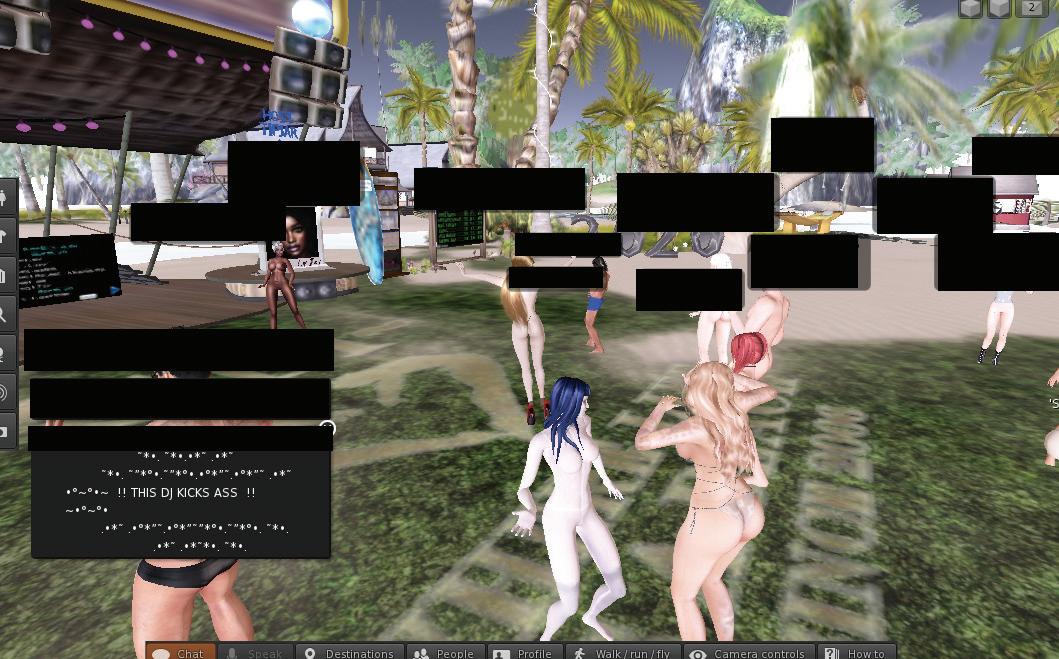
The virtual world is still a sanctuary for folks leaning into their sexual fantasies.
By S. NICOLE LANE
When I first walked into Black Planet, a sci-fi-themed erotic adult night club, I stood around for a few minutes. I started to jump and fly a little, but quickly realized this wasn’t proper sex club etiquette—some clubs even ban it. This particular club offers live music every day from 2 PM to 4 PM, and I arrived just in time. Neon phallic shapes lit up the room and a figure with large black wings led the dance floor. The dark electro pumped throughout the club as I stood there, beneath the purple and blue lights, unsure of what to do. Don’t worry, I didn’t break my quarantine, but being in my virtual club atmosphere, I had flashbacks of the real-life club. The stench of sweat and beer came rushing back. However, I felt content in Black Planet, sitting in my pajamas in real life, completely nude in Second Life.
Currently, there are about 800,000 to
900,000 users in Second Life (SL), which has declined from its 2013 peak of 1.1 million. The virtual world came to life in 2003 and is one of the oldest 3D cyberspace simulators. After picking an avatar, the free virtual simulator takes you through a short tutorial, and after that, the world is yours. While the fanbase may be dwindling, SL is still incredibly strong with dedicated users, especially those with an interest in BDSM and fetishes. Users can voice chat, send messages, or simply float around (like a voyeur) in SL. Without leaving the comfort of their home, a user can teleport to any fantasy they’ve ever had—sexual or otherwise.
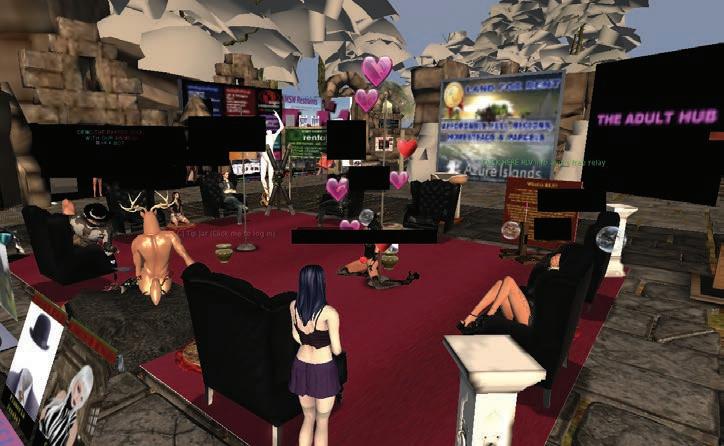
User MistressLove is a full-time club owner and former sex worker on SL. “I’ve been playing since 2005,” she says. “I’m an oldie!” While every club may ask for di erent requirements, the basics are that the avatar must be 18 years old in real life (user entered) and have an outfit
that appears appropriate for the club (the less, the better). Some clubs, like MistressLove’s club, require voice verification. Users only need to be 13 years old when signing up for SL, but there are age restrictions on entering areas with adult content, as well as on purchasing certain items from the marketplace.
In the Adults Only section of SL, there is an abundance of fantasies, kinks, and desires to choose from (over 100 to be exact). The Femdom Mansion o ers discussions, parties, and contests on a weekly basis. It’s newbie-friendly and invites open conversation to the femdom side of BDSM. Places like the Forest Mansion are set in a German adventure world where you can participate in moderate BDSM in the space amongst live singers, tribute bands, and DJs. Traveling even further, Planet Enzyion o ers a magical, otherworldly experience and is a popular honeymoon destination. Adult-only photographers travel here for photoshoots. Bootys ‘n Beauties is a genderfluid hangout spot for all sizes and identities. Nookies Gay Club is for gay men to hit the gym, shop together, or enter private rooms. People who participate in specific lifestyles, like furries, can head over to Furry Hangout for private rooms, monthly ra es, events, and live DJs. And if you’re looking for your vanilla gentlemen’s club, look no further than Labyrinth, and go to Unleashed for an adult venue geared toward women.
There are burlesque clubs, nude beaches, sacred forests, roleplay clubs, and swingers resorts. It’s a catalog of sexual preferences.
MistressLove was a virtual sex worker for
a few years before opening her club in the virtual world. “I wanted to see more dungeons in the game. Fetish wear and BDSM are popular communities in SL but I wanted to see a very specific type of dungeon, which I wasn’t getting.” After working in the scene for a few years as a dancer in an LGBTQ-friendly strip club, she decided to take the business plunge. “It’s important to know that investing in a club in SL [has] cost me hundreds of U.S. dollars.”
Like real life, SL’s groundwork lies within commerce, as money is still imperative to the survival of businesses and the future of the virtual world. In SL, however, ways of making or spending money are much more surreal and alternative (like purchasing virtual pubic hair from a seller). Users have Lindens, which are the currency within SL, to purchase items, skins, and pay for services at clubs like MistressLove’s. A premium membership for SL costs $11.99 a month and includes a weekly stipend of L$300 and a signup bonus of L$1,000. Premium members can buy land, invest, and purchase items more freely in the marketplace. “So you basically always have some kind of money and are technically making money just by being on the game every week,” says MistressLove. “In addition to hosting particular events (which include ra es), I also sell items that I think are beneficial in running my business. I sell skins and accessories for those interested in bondage. This gives me extra revenue in running my venue. Not everyone is going to pay for a Dominatrix. Some people just [come] in to stand around.”
14 CHICAGO READER - MAY 28, 2020 ll
&
GAMING
Approximately L$252 equal one U.S. dollar. Linden Lab’s wholly-owned subsidiary Tilia handles the transaction between SLD and USD for users who want to convert their Lindens to real-life dollars. VirWox, a virtual currency exchange that closed in January 2020, was the easiest way for SL players to convert their Lindens. Other popular ways of converting money include Open Metaverse Currency, Robinhood, Upload, and Buttercoin. Folks on SL can also exchange their money with Bitcoin and on LindeX, SL’s o cial virtual exchange. “Overall, the exchange isn’t much,” says MistressLove. “My club is a labor of love. I don’t pull as much as I put in. But that’s okay with me.” SL is filled with so many clubs, worlds, beaches, resorts, and anything else you can dream of that sometimes the clubs are more empty than filled. “With so many clubs, there aren’t enough players to fill the space. That’s why specific clubs are so successful. Hosting events and contests at particular times are key to a great business model in SL. It brings people to the club and fills the space.”
Of course, not every club makes it in SL MistressLove says she knows many people who have opened and closed clubs within a six-month timespan. “Land, building, marketing, advertising, sta , music, security all cost money for me. I have invested a lot of time and finances into my club and I’m really proud of it but it wasn’t easy.” MistressLove decided to purchase land instead of renting, which would include a landlord and could create an extra headache since it’s an adult-only business. “Linden Lab can come to me if they have any issues with my business. I’ve owned it since 2016 and haven’t had any problems! I consider myself a success story,” she says.
When MistressLove was a sex worker a few years ago, she remembers teleporting a patron to an island to perform for him. “He kept telling me how he could never do this in real life and how his shyness prevented him from visiting a real club.” For some sex-club beginners, SL o ers the ability to learn more about a certain kink or fetish. Workshops, seminars, conversations, and libraries geared towards sexual interests are available for avatars to explore. Users can indulge in their desires without any restraints. “I loved being able to work as a dancer and an escort. It’s something I would never do in real life. I would never own a dungeon in real life either. I love being someone else on Second Life, and I love being able to
please people and give them what they want.”
MistressLove may not be making millions o of her sex work and sex club, but she says, “I’m a disabled woman who suffers from chronic illness. I couldn’t get up and dance on a stage even if you paid me in real life! Second Life has given me the freedom to be who I fantasize about. I don’t think I would be a sex worker if I was able-bodied per se, but I do enjoy being able to dance, slide down a pole, perform sexual acts, do backbends, and whatever else all while sitting in a wheelchair in real life. That’s worth so much more than the money.”
Ifound myself in oRgAsMs, a free adult sex lounge with poles and vivid videos displaying sexual acts.

“You’re basically up my ass,” someone typed to me when I realized my avatar was literally on top of them. This room prohibits voice chat so the chat feature is appreciated for a novice like me. Still, I gasped, not knowing where to go or where to run. I ran straight into another avatar who was completely naked and whose penis almost reached his toes. With a large whip between his legs, Jorg578 typed, “Hi sweety, how’s your day going?” Panicked, I teleported to another world. Yes, I was chickenshit. Even in this virtual reality world, I ran away from men talking to me. But I found that in every world I went to I was met with another unsolicited conversation. In retrospect, what did I think was going to happen? It’s a sex club in cyberspace. I ended up in Skinny Dip Nude Beach where I watched dancers, chatted with a man-deer hybrid, and sat on a pink dildo machine.
I’m a bit relieved I didn’t indulge in SL at an earlier age. I can easily see how I would have been slack-jawed, sleep-deprived, and finger-cramped at 14 years old. It’s better that I explore now when deadlines are due and I have real-life responsibilities that prohibit me from denying myself any sleep.
User HaileyNicole has been playing SL since she was 12 years old. Back in 2009, users could join as a teen sim, but now, you have to be 13 years old and there are restrictions for younger folks.
Since she’s not working during the pandemic, HaileyNicole has been playing SL every day. Normally, she plays four days a week at night. When HaileyNicole first reached out to me, she mentioned that SL can be judged and stereotyped. I asked about this, via e-mail correspondence, and she explained that SL is seen as something that features adult content and
is played by someone who is “in a basement that never sees daylight.”
HaileyNicole says, of course, SL does have those types of people but “there are also some amazing communities, churches, events, games, parties. There are people that had a really bad childhood and they can recreate it in Second Life to have a good one. Disabled people that can do anything their heart desires that they can’t do in real life, women that can’t have kids can go through a virtual pregnancy and have a child and grow a family. There are businesses that support people’s families in real life, there are fundraisers that raise money for real-life people and places and events. People meet lifelong friends, partners, lovers.”
HaileyNicole created a large family, which is something that she doesn’t have in real life. She met her SL family in real life this past year. Her SL parents are the same age as her real-life parents and her SL sister is just two years younger than her. She says there was no awkwardness. They ate at a restaurant, went to a garden, took a tour of a museum, and stayed at an Airbnb. “Our parents consider us their real kids that they didn’t get to have together because they met later in life,” she says.
SL has given HaileyNicole the freedom to escape without any worries. “I can look however I want, do whatever I want, and be the person I may not be so comfortable being in real life.” It wasn’t until last year that HaileyNicole participated in sexual activities on SL. She says while she doesn’t date much in SL , as she’s more into dating in real life, she did see potential in someone last year. They went on a date, listened to soft music, and sailed across open waters. After hours of talking and dancing, the duo had virtual voice-chat sex. HaileyNicole doesn’t visit the several sex avatars and clubs on SL because she’s personally not a huge club fan. She’s more into exploring, shopping, and playing games. But her real-life best friend was a sex worker on SL so she knows a bit about the lifestyle. “At those clubs, the girls get paid, DJs and hosts get paid, live singers get paid, and they all make pretty good money off of these tips,” HaileyNicole explains. “There are a lot of ways you can make money in Second Life. It is some people’s full-time jobs (mainly creators).”
I’ve dabbled in SL as a lifelong Sims player, but I became overwhelmed and frustrated at not understanding it right away. HaileyNicole says this is common. “People will come and try to play it but when you are new it is so hard to get into it and figure it out unless you have
someone helping you. Everybody has a di erent Second Life experience and this is just mine and my opinion from what I have seen and experienced.”
You can be a banker, real estate agent, wedding planner, tattoo artist, a person who sits in a camping chair (long durations of sitting can earn you the small amount of L$1 per 10 minutes), or a sex worker in the groundbreaking reality of Second Life.




I signed o of Second Life after visiting Skinny Dip Nude Beach. “Thunderstruck” by ACDC played as the DJ announced that for the next two hours they would be playing 80s hard rock hits. I passed signs that advertised “free cock” and found my way to the nude beach to join the dance party. I was reprimanded for wearing stockings and was instructed to remove them. All nude or swimwear only allowed. Yes, sir!
As “More Than Words” by Extreme slowly started playing on the dance floor, a user began to sing the lyrics to me on voice chat. The rest is Second Life cybersex history. v
@snicolelance
MAY 28, 2020 - CHICAGO READER 15
Scenes from Second Life S. NICOLE LANE ARTS & CULTURE SUBMIT YOURS FOR FREE at chicagoreader.com/matches DATING APPS GOT YOU DOWN? Try finding someone the old-school way.
GAMING
The Wild World of Animal Crossing
By TARYN ALLEN
For most of my life, Animal Crossing was a tiny and indescribable world made just for me. It was reserved for the turquoise Nintendo DS original that I got for my eighth birthday, the now-clunky-feeling device that hosted a sticky and peeling Nintendogs decal across the front and served me throughout my childhood. Playing Animal Crossing: Wild World on that thing was a daily routine during my heaviest DS-playing years, and I was always astonished at how deeply I cared about my weird, anthropomorphic digital town.
Of course, as I grew older, my DS-playing tapered off, and I began to accept the fact that Animal Crossing was but a fond memory of my childhood, of long car rides on the way to vacation, of beautiful summer days squandered by virtual obligations.
That is, until a few months ago, when turnip prices, tarantula catching, Tom Nook memes, and all sorts of other hyper- An-
imal Crossing -specific content began to flood the Internet. Suddenly, celebrities like Elijah Wood and Guy Fieri became faces of the game, interacting with Animal Crossing fans on Twitter and Instagram. Local institutions like the Goodman Theatre began to enter the conversation, posting on Facebook some screenshots of Animal Crossing characters recreating recent Goodman shows. Even national athletic teams started joining the fun, like the Detroit Lions, which used the game to announce their schedule.
My guess is that, if you didn’t know what Animal Crossing was before March, you do now—the well-timed release of Animal Crossing: New Horizons has made it the official game of quarantine. However, I’ll debrief for those still confused.
Animal Crossing is a social simulation game where you, as a human character, live on an island full of animals. It’s intensely open-ended, with no core objectives aside

from building your world exactly how you want it. You do things like hunt bugs, catch fish, dig up fossils, earn money (“Bells”), customize your house, and socialize with others, all to the real-time pace of the calendar year. There’s even a fluctuating economy, including a stalk market, a high-risk high-reward way to get rich by buying and selling turnips.
I understand that it does not sound fun. Animal Crossing: Wild World —my childhood version—even starts out by gifting you a hefty home loan and forcing you into a job to start paying it off. (In my quest to describe the game’s charm to my girlfriend, that’s where I lost her.)
And I admit, Wild World hasn’t aged too well (the graphics look practically 8-bit now). However, with each new iteration that has surfaced since the original in 2001, more features and characters and customization options have been added, and Animal Crossing just keeps one-upping itself.
The game is quaint and artistic, with pastel colors and lulling music, and because it operates on an actual time clock, players experience a different environment playing in the morning versus the evening. It inspires a compulsive need to check in frequently, to ensure that you don’t miss any special events, the first digital snowfall of the year, or a new villager’s arrival. The daily upkeep of pulling weeds, completing simple quests, and earning money is just enough to convince you to log on every day and keep playing, in a way that miraculously feels less like a guilty time suck and more like a calming part of your routine.
It’s calming because there’s really no way to lose the game. The new autosave feature in New Horizons prevents the greatest hardship that came from its predecessors, which was accidentally losing hours of progress. Sure, you can lose money, have a villager you dislike, or neglect the game for too long, but even the rainiest days on Animal Crossing are more serene than high-stakes violent video games.
That’s why it’s no surprise that New Horizons has taken over the world. After creating versions for GameCube, DS, Wii, 3DS, WiiU, and mobile devices, Nintendo released the newest for the Switch on March 20, and it’s widely agreed to be the best yet, and not
just because of its newness or the desperate boredom of people in quarantine. While I haven’t yet succumbed to peer pressure and desire and spent my stimulus check on a Switch (I’m close, trust me), it’s obvious that New Horizons should top all of its predecessors. It’s hard to imagine a game having a better foundation on which to build, with nearly two decades of success stories behind it.
Despite all this success and my own personal affinity for it, it’s still hard to describe what it is about the game that makes it so wonderful and addictive.
One potential factor is the main character customization, which has only improved in the newer versions. As a kid, for me, this was as simple as choosing “burly” instead of “cute” and playing as a boy, better able to express my sense of style and avoiding the real-life scorn at my picking shorts and a T-shirt over a dress every time. Today, it means creating a character that looks just like you (even for people of color, after many years and much backlash), inventing someone totally new, or creating a celebrity look-alike.
Then there’s the element of connecting with others; it used to come in the form of physically linking up on DS and visiting another town close by, but New Horizons is equipped with an entire airport that can connect players anywhere in the world, as long as they have WiFi. The Switch game has opened a doorway for socializing right when people need it most—even if “socializing” just means staying at someone else’s virtual home instead of your own.
Overall, the Animal Crossing world is something special. The game feels like it’s built for everyone in the world while simultaneously feeling like it’s built for you, and you alone. Even though I have yet to get my hands on a Switch, it’s been a pleasure to see this game hit the mainstream, beloved by people who get as much joy from it as I did when I was eight years old. v
@itstarynallen
16 CHICAGO READER - MAY 28, 2020 ll ARTS & CULTURE
What is the appeal of the game that’s taking the world by storm?
The author in action on her Animal Crossing island. NINTENDO / VIA TARYN ALLEN
pleaserecycle thispaper
GAMING
Interview with a gamer
In which my 11-year-old friend George takes a break from staring at his computer and consents to an interview.
By SALEM COLLO-JULIN


My friend George is 11 and grew up on the south side of Chicago. He’s a CPS student just finishing o the sixth grade. I’ve been friends with George since his birth— his parents are two of my best friends. George is an avid online gamer so we chatted about his favorites (and to his credit, he did not roll his eyes at me while I told him my GenX stories about playing Ms. Pac Man and pinball at the arcade).
Salem: OK, so what year were you born?
George: 2008.


How did you first learn about computers, and what was the first one you remember using?

The first one that I worked on was . . . I think it was my father’s. He owned a laptop (which he also broke later). It was sitting in a corner of our house on a chair and I always used to wake earlier in the morning than anyone else to get on that computer and play stick figure games.
What’s a stick figure game?
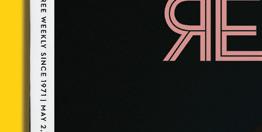
The characters are all stick figures. The ones that I played usually asked you to create armies of stick figures and there were characters like swordsmen, wizards, giants, and archers. You could buy other characters from the game and then you could send them out to fight other parts of the campaign or other missions.

Wait, let’s back up for a second—how old were you when you were doing this?
Five or six years old.
How did you know how to do anything on a computer then? And how did you know that there were games on the computer?
I think it was first in kindergarten—we had little computer games that we played in class for computer assignments, like mini games about math and reading. And then from there I wanted to play more games. That’s how I found out about the other games on the computer.
Have you always had some sort of computer in your classroom at school? Yeah.
When do you remember first talking with your friends about computer games and finding out that other people were also playing them?
Afterschool care, which is like an extracurricular activity: you have special classes after school ends but it’s still in the same building. I heard about games from older kids that played games and then I’d also try to play those games and then I’d talk to them about the games.
Do you remember the first computer game that you were really excited about?
Probably Minecraft Pocket Edition . It’s like regular Minecraft but made for iPads and things like that. I liked it because I could play with my cousins and my friends because it’s free and lots of my friends didn’t have computers but could play on a phone or their tablet from school. Some of my friends could use their parent’s computers but usually they couldn’t, like, download games on them. And also I don’t think I knew how to download games at that point.

So now you play multiplayer games online with other people. One of the things that concerns me is that you’re potentially playing with all kinds of people from all over the world. What are some of the things that you and your friends do to make sure that you’re not playing with people that you don’t want to talk to?







Usually my friends and I just create a private party (within the game) where we can talk. No one else can join unless we had invited them.
Is that something that you learned about in school, safety on the Internet?











Yeah. Because we had a really good computer class talking about safety online: how to keep your information safe, never share your password. Stu like that. I’d say that was in first grade and second grade.
Tell me about the games you play on a regular basis these days.
Most of the games that I play are usually really popular online games: Counter-Strike: Global O ensive, Rainbow Six Siege . . . sometimes I play Roblox because lots of my friends don’t


have the other games or can’t download them and on Roblox you can play with everyone for free online.





What other kinds of things do you use your computer for?
I study and research things a lot, writing papers.
Do you have any favorite game of yours that’s not on a computer or a phone?
I guess basketball. v
Providing arts coverage in Chicago since 1971.

www.chicagoreader.com














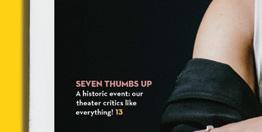




MAY 28, 2020 - CHICAGO READER 17
ARTS & CULTURE
Roblox SALEM COLLO-JULIN
THEATER
GAMING Theater nerds and gamers unite
Otherworld Theatre unveils a digital LARP.
By KERRY REID

Role-playing games and theater seem so closely aligned that it’s surprising more companies haven’t fully embraced gamer culture as part of their aesthetic. (If you can believe that pirates somehow miraculously appear in the nick of time to save Marina’s life in Shakespeare’s Pericles, you can pretty much believe any of the narrative twists in LARPs.) And in pragmatic terms, there’s also a helluva big potential audience in gaming fans for theater companies eager to reach new patrons.
But it’s still relatively rare for the world of online games to appear onstage beyond surface tropes and broad-brush stereotypes about nerd culture. An exception is Madhuri Shekar’s 2014 play In Love and Warcraft, which blended the story of an undergraduate “gamer girl” and her complicated feelings about relationships with World of Warcraft. Shekar’s play received several productions around the country, including one with Chicago’s Halcyon Theatre in 2015.

Some theaters are also increasingly borrowing structural elements from LARPs via immersive choose-your-own-adventure stagings. The UK company Punchdrunk’s Sleep No More, their site-specific ambulatory take on Macbeth that has been in NYC for years, where patrons wander as they will through a series of rooms evoking the “Scottish play,” comes to mind. But those productions don’t lean fully into games culture. Patrons are voyeurs who can walk around where they choose, rather than active
participants in the narrative.
But for the past several years, Otherworld Theatre has been successfully creating stronger connections between games and theater.

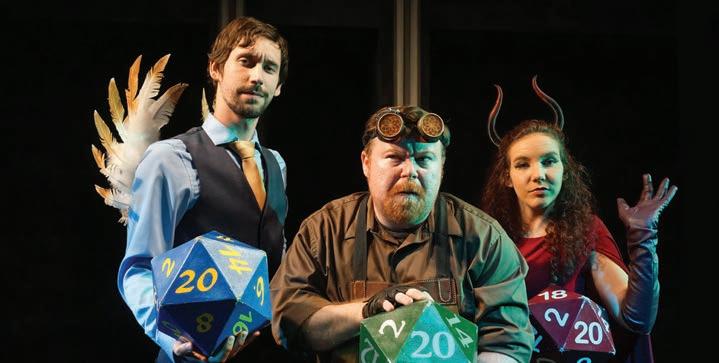
Appropriately, the idea for Otherworld came to artistic director Tiffany Keane Schaefer while she was waiting in line for the midnight release of the video game Skyrim . Schaefer, who was studying directing at Columbia College Chicago at the time, notes that “there were a lot of discussions [in class] about ‘how do we engage young people in theater? Theater is dying, you know.’” Looking around the line, Schaefer says she decided “these are my people and I wanted to have the theater where people are standing in line at midnight, talking about the narrative that they are going to explore.”
Since its founding in June of 2012 as a theater devoted to science fiction and fantasy, Otherworld’s productions have included adaptations of classic sci-fi stories, such as Ray Bradbury’s stage version of his novel Fahrenheit 451 and Edgar Rice Burroughs’s A Princess of Mars (adapted by Schaefer and Nick Izzo), to original fantasy tales such as Joseph Zettelmaier’s The Winter Wolf, the company’s version of a holiday show. But they’ve also infused much of their work with an open appreciation for what bringing in the world of gaming can do onstage.
Last year, they unveiled Super Richard World III , the inaugural production of their in-house Stupid Shakespeare Company. That
18 CHICAGO READER - MAY 28. 2020 ll
Don’t miss an issue Get the Next 12 Weeks of the Chicago Reader Delivered to Your Home CHICAGO’S FREE WEEKLY SINCE 1971 MARCH 26, 2020 STAY AT HOME chicagoreader.com/support
show, created by director Joshua Messick and Katie Ruppert, smashed together Richard III with Nintendo characters; Duke Luigi played the scheming pretender set against Mario and Princess Peach. Reader critic KT Hawbaker described it as “a fucking hoot.” In addition to scripted productions, Otherworld also has offered the weekly Improvised Dungeons & Dragons . (Stupid Shakespeare and Ruppert also created PickleRickickles, a mash-up of Pericles and Rick and Morty.)
Like every other theater in the world, Otherworld’s live shows are now on hiatus during the pandemic. But they decided to do more than just put archival material up on their website (though you can see recorded versions of Super Richard World III and other shows online—some free, some available for a small fee through Patreon). They’ve decided to take advantage of the shutdown to go even further into the world of online games.
In late April, the company unveiled VAL-
HA11A , their first all-digital virtual LARP through its in-house game production company, Moonrise LARP Games. Moonrise has produced in-person LARP events over the years, such as Dark Labyrinth, which draws on gothic horror, and Albion: School of Sorcery, which, as the title implies, uses the world of magic as its backdrop.
VALHA11A completed its initial arc on May 27 but will be returning for another installment later in the summer. “You sign up and you are playing up to five episodes for your character,” explains Schaefer. The premise for the game is that players are “Vikens,” or members of an ancient race known for their interstellar navigational skills, and they must complete the journey known as the “Grand Rite.” Players choose a ship at the beginning of the game, which, notes Schaefer, “kind of dictates what kind of experience you will have,” though players can also, via Zoom breakout rooms, travel to di erent realms. Actors from the Otherworld ensemble play the captains, AI computers, and fellow crew members. It’s not necessary for a player to have been part of the first arc, or “saga,” as
Schaefer calls it, to do the second. Otherworld charges players $35 per episode, or $150 for the entire campaign; the first saga played every Wednesday at 7 PM for three hours.
Otherworld has done their own immersive ambulatory productions in the past, such as 2015’s Gone Dark, Stuart Bousel’s story of vampire hunters staged at Epworth United Methodist Church. And their non-digital LARPs with Moonrise have involved “taking over grand estates and people are staying there for three days and they are LARPing for three days,” says Schaefer.
The challenge with VALHA11A , she notes, was, “How do you translate that online where everything is so cold? At least right now, humans are not used to connecting through a screen. Humans are not used to looking at a lens. We had to retrain our actors a little bit as NPCs [non-player characters].” She adds, “Some of the challenge with being online is that there is a delay, and as actors in a live performance, you’re always trying to fill space with content, with drama, with light changes, what have you. In a digital sense when you
don’t get those social cues, or body language cues, you have to wait seven seconds for the other person to respond to whatever it is you have just done. It feels very alien to communicate in such a way. Our first episode, it was a little rushed, and we got the feedback from our audience about ‘we need time to process the information.’”
Still, Schaefer sees the new online LARP creations as not just a way to fill time before Otherworld can reopen their venue, but as part of the company’s larger mission of being a “bridge” between game fans and theater lovers. “It’s really the nerds who pushed through for us. We are such a niche company. We’re excited to join this community of gamers and nerds alike in creating a community and a home for them. This fan base is just so dedicated to helping science fiction and fantasy stories come together that it’s really been them, even now in this pandemic of COVID, that have come through for us and supported the art that we’re doing online now. So . . . hashtag blessed.” v
@kerryreid
MAY 28. 2020 - CHICAGO READER 19
Improvised Dungeons & Dragons TIFFANY KEANE
SCHAEFER
THEATER
Get ahead, catch up, try something new. REMOTE CLASSES BEGIN JUNE 22 NORTHWESTERN.EDU/SUMMER REGISTER NOW
Victory Gardens playwrights ensemble gives notice
History rhymes with change at the top.
By CATEY SULLIVAN
Friday’s resignation of seven playwrights from Chicago’s Tony-winning, 46-year-old Victory Gardens Theater—announced by the playwrights in an open letter on Medium—isn’t precisely history repeating itself, but it does hearken back to 2011. That’s when the first playwrights ensemble—cultivated under longtime artistic director Dennis Začek—left shortly after Začek retired and playwright-director Chay Yew took the reins at the $3 million regional powerhouse.
In 2011, the original ensemble protested what they claimed was new leadership’s lack of transparency and respect for the theater’s mission.
Both charges are now being leveled again. Only this time, it’s Yew who has left and his ensemble that is making the claims as Erica Daniels, who served as Victory Gardens’ executive director under Yew, steps into the newly created position of executive artistic director. And while the original ensemble was ousted involuntarily, the latest departures were voluntary. As late as last Thursday, Daniels stated that she was looking forward to working with the ensemble.
The residency terms of three of the playwrights who resigned Friday (Marcus Gardley, Samuel D. Hunter, and former longtime Chicagoan Tanya Saracho, now the showrunner for
Vida on Starz) had already expired before their resignation was tendered, the theater said in a written statement. Less than two years remained in the terms of the other resigning playwrights (Ike Holter, Naomi Iizuka, Luis Alfaro, and Laura Schellhardt). Iizuka and Schellhardt have never been produced at Victory Gardens, the theater’s statement added.
Holter has a show slated for the 2021 season—a revival of his 2014 play Exit Strategy, originally produced by Jackalope Theatre. He declined comment on whether his resignation would mean he’d pull his show from being mounted at a theater that—per the letter he and the other playwrights signed—“purposely ignores the mission” and “abuses the very resources it claims to value and support.” Neither Gardley nor Saracho could be reached for comment before press time.
Friday’s resignees echoed the frustrations that their predecessors expressed: in hiring Yew, the Victory Gardens board acted in direct opposition to Začek’s wishes—supported by his playwrights ensemble—that Sandy Shinner be his successor. The New York Times detailed the ensuing outrage. Shinner is now artistic director for Shattered Globe Theatre.
Within weeks of Yew’s arrival, that original playwrights ensemble—including Pulitzer winner Nilo Cruz—was abruptly moved to emeri-
How to Defend Yourself at Victory Gardens LIZ LAUREN
tus (or “alumni”) status. Several of the newly minted “alumni” learned of the change when it was published in stagebills. Yew then brought in his own ensemble, the one that largely resigned this week.
Fast forward to December 2019, when after nearly a decade at the helm, Yew announced his departure. Almost six months after Yew’s announcement, the Victory Gardens board named Daniels as the theater’s executive artistic director, a post that joined two previously separate jobs: artistic and executive director.
As did the ensemble before them in 2011, the current playwrights ensemble blasted the theater on social media for excluding them from the process of deciding new leadership and ignoring the artistic community it purported to serve.
Alfaro said that five months ago, the playwrights ensemble formally wrote the board to demand accountability and transparency in the hiring process for Yew’s replacement.
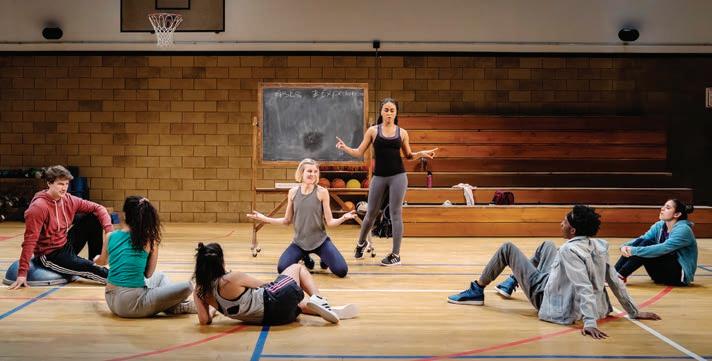
“I do not doubt she (Daniels) might be the most qualified person. Our biggest problem is that there was no process and no transparency. To not be in communication with your own community—that’s the violation,” Alfaro said.
“The board president [Steve Miller] responded and said, ‘Absolutely, we’ll be in conversation. We’re going to have a process. We’re going to include everybody in that process. There will be transparency.’ And then there was silence. If someone tells you something and they do the opposite—that tells you something right? When you lose that trust—that’s when it feels like there’s no place for you there,” Alfaro said.
Late Friday night, the theater responded with a statement on behalf of board president Miller:
“Steve Miller spoke with an Ensemble Playwright following the open letter to the Board. Steve promised that the board would, as always, uphold the mission and vision of the theater. He did not promise to involve the Ensemble in the board’s process to determine the theater’s future leadership. It is true that Victory Gardens did not give the Playwrights Ensemble advance notice before the public announcement.”
Hiring practices at the theater have never involved the playwrights ensemble under either Začek or Yew, the theater added. The playwrights ensemble does not have a financial stake in the theater.
There was widespread support for the ensemble amid earlier social media reports
that 60 artists had signed an e-mail petition to the Victory Gardens board in early March, requesting “an open, inclusive, equitable and transparent search for its new Artistic Director.” However, Black Lives/Black Words managing curator Reginald Edmund, in a Facebook post last week that he stood by in a subsequent interview, drew parallels between Yew’s arrival and Daniels’s appointment.
“When the board forced the founder (Začek) out to pasture, where was your collective outrage? When they kicked out the entire original playwrights collective and treated them like pariahs in their own artistic home when it was their work that oftentimes kept that company afloat, where was your outrage?” he said.
“I’m not against what they’re doing. I’m questioning their motives,” Edmund added.
“You resign, but your residency has already ended? You resign, but you’re letting your own play stay in their season? You’re resigning but you actually haven’t written a play in years? I think if you’re going to protest, protest. Don’t half-ass it. I find it di cult to take these arguments seriously when they are among the few marginalized artists with access to a system they have historically profited from, and haven’t used that to boost the voices of their peers,” he said.
At the time he was hired, Yew was one of the few artistic directors of color in the country heading up a theater that isn’t geared toward race- or ethnic-specific work. Those numbers have increased in recent years, with high-profile theaters such as Oregon Shakespeare Festival, Actors Theatre of Louisville, Long Wharf Theatre in in New Haven, Woolly Mammoth in Washington, D.C., Baltimore Center Stage, and Repertory Theatre of St. Louis all hiring new artistic directors who are either Black or Latinx—a development noted in the March petition.
Daniels comes to the executive artistic director position after some 30 years in the Chicago theater community, including stints in leadership positions with Second City and Steppenwolf Theatre. Her hiring marks a departure of sorts in the local theatrosphere, where venerable, well-funded theaters have long had directors at their helm: Goodman artistic director Robert Falls, Northlight’s B.J. Jones, Chicago Shakespeare’s Barbara Gaines, and Lookingglass’s Heidi Stillman all put in long careers directing and/or acting before taking the reins of their respective institutions.
Daniels has never been a director; she has a degree in performance studies from Northwestern. After a brief foray with the FBI, she
20 CHICAGO READER - MAY 28. 2020 ll
THEATER NEWS
THEATER
went to work as a casting agent after college but quickly settled back into theater.

Before Victory Gardens, Daniels was president of Second City Theatricals, where she oversaw the comedy institution’s shuttering and comeback after a fire destroyed much of their Old Town structure. Before Second City, she was at Steppenwolf as a casting director, as the head of the School at Steppenwolf, and as associate artistic director under the late artistic director Martha Lavey.
In an interview shortly before the Medium letter was posted, Daniels addressed the duality of a new position that demands both the artistic vision to keep the theater’s persona intact and the business acumen to ensure its survival in the midst of a pandemic. The shutdown has caused massive financial losses in the performing arts sector and will require outsize e orts to keep artists and audiences safe in a world where COVID-19 complicates everything from costume fittings to concessions.
“We always want to achieve the visions of our artists. That’s the priority. It always will be. You recognize when something needs more than you anticipated, and you work to make it happen,” she said. Daniels pointed to Lee Edward Colston II’s epic The First Deep Breath, which premiered at Victory Gardens in November, where she made the decision to cancel revenue-generating previews because the script was still evolving and to this past winter’s How to Defend Yourself by Liliana Padilla, where a character was added late in the game.
“Come hell or high water, you want to achieve the artistic vision. I don’t think I’ve ever sacrificed that,” she continued. “I think if you speak to the directors and writers and actors and producers I’ve worked with over the years they will tell you—I’m not a ‘no’ person. I’m a ‘yes, let’s figure it out,’ person,” she said.
Whether Victory Gardens will put a new ensemble in place remains an open question. Daniels says her immediate goal is seeing the theater through the pandemic. The company hosts a virtual version of its annual Ignition Festival of New Plays beginning in June. There is no timeline for reopening, but she said that by early June, there probably will be.
“The mission of Victory Gardens has always been to bring a wealth of di erent voices to the table. I have no intention of stepping back from that. We hope to continue our relationships. And there are new generations and voices that need to be heard. That’s the goal. That’s always the goal,” Daniels said. v

MAY 28. 2020 - CHICAGO READER 21 THEATER
@CateySullivan
GAMING
Trying to be a player in Got Game?
By SIRI CHILUKURI
Khudejha (Kauser Mohamed) has a problem. She’s wearing too much clothing— or rather the wrong type of clothing. Upon arriving at a sex party that she was invited to by a friend, she’s told her “power shirt” is in fact lame and that she should undress appropriately. We learn through her friend Natasha (Aasia LaShay Bullock) that it’s been a while since Khudejha got some (or any) and this kink party is going to be a reset.
Got Game? , a new short film written and directed by Fatimah Asghar, is a unique look at one woman’s experience at a sex party and the trials and tribulations of sexual and social etiquette in queer spaces. Our protagonist, Khudejha, is a Pakistani-American queer woman who’s out looking for some strange, and is joined by her friend Natasha for the ride.
Asghar is known for creating the acclaimed web series Brown Girls with Sam Bailey, who serves as executive producer on Got Game? Other notable Brown Girls alums include star Sonia Denis, who has a guest appearance as an astrology-obsessed partygoer, and Jamila Woods, poet, musician, and Asghar’s real-life best friend, who serves as music supervisor.
Throughout the film, vivid graphics show Khudejha’s power, thirst, and defense levels going up or down depending on the situation.
A demeaning comment decreases Khudeja’s power, a flirty smile from a cute girl across the way raises thirst. In this time of social distancing and isolation, a party like this is impossible for the foreseeable future, but the stress and anxiety brought on by trying to initiate flirtation, a date, or sex, especially in a queer setting? That’s always relevant.
In one segment of the film, Khudejha needs to avoid turtle shells and bananas, a clever metaphor for people who under the guise of flirtatious behavior are just weird and creepy, to get to the star—someone worth pursuing.
Like Khudejha, I’ve been surrounded by people at parties and made polite conversation when really there was only one person I wanted to talk to. At a friend’s party last summer, I talked to friends and acquaintances alike before gathering up the courage to speak to a beautiful, platinum blond friend of a friend. I complimented them, they complimented me back, and all the time I spent maneuvering conversations with familiar people suddenly seemed to not matter. At that moment it was
just us two.
Sex and dating, like anything, is difficult, mostly due to the fact that everything is implicit and especially when those signals and roles which seem to be clearer in heterosexual dating and relationships are vastly di erent from queer dating. Asghar’s decision to include video game graphics is genius because it makes the implicit explicit. We see Khudejha’s various moods dictate the combination of thirst, power, and defense, but also we can tell by Mohamed’s expressive reactions to situations how Khudejha is responding to sexual and romantic rejection and numerous advances by multiple people—her acting beautifully complements the video game graphics.
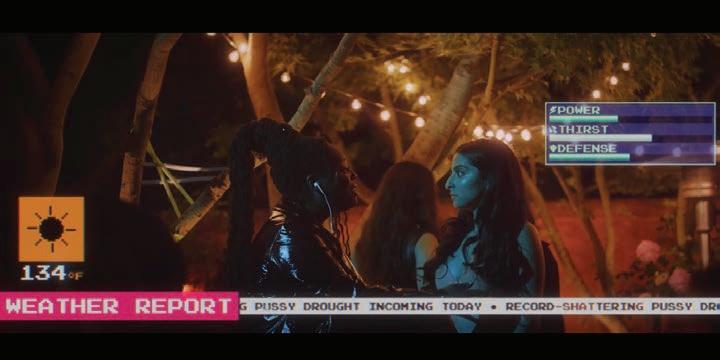
At one point, Khudejha is in the pool, surrounded by people but still utterly alone, appearing to be a floating head in water. It’s a common feeling, to feel alone after a conversation ends with “I have a partner,” or your friend is nowhere to be found. The irony of feeling that way in a space that is supposedly inclusive is not lost on me, because I’ve felt that way before. At a friend’s birthday celebration, at a Brooklyn house party, at Pride—just because you are sharing space with people who share the same identities and values as you doesn’t take away the fact that social and sexual interactions are daunting and scary, even more so when you can be rejected by “your people.”
In the end Khudejha finds someone and she shares stilted, awkward yet triumphant conversation with her about how parties and especially sex parties are maybe not their speed. She eventually gets to hold said person’s hand—known only to us as crush—the ecstasy of that moment which is denoted by a crush bar gleaming rainbow colors with pixelated avatars of Khudejha and her crush above it. This moment is of course ruined by Natasha who tells her it’s time to go, while the phrase “PUSSY BLOCKED” flashes across Natasha’s face. The interaction is beautiful and messy and awkward. It reminds me of stolen moments with my first girlfriend and moments since with other queer people. The euphoria comes not from finding someone to have sex with or even make out with, but from the realization that “winning the game” is something that you can define for yourself. v
NOW PLAYING
R End of Sentence
End of Sentence is a melancholy movie. A er Anna (Andrea Irvine) dies, she leaves behind her husband Frank (John Hawkes) and son Sean (Logan Lerman) with a request that they unite to scatter her ashes. Determined to grant Anna’s dying wish, Frank picks up Sean the day he’s released from prison with a deal his estranged son can’t refuse. A road movie, they embark on a trip to Ireland that allows viewers a vicarious escape to a beautifully shot Irish countryside as the men remain confined to a car facing unresolved issues. They reconcile, of course, but not before taking a few wrong turns. The most interesting of which comes when they meet Jewel (Sarah Bolger), a breath of fresh air that teeters on being a cliche before revealing the unexpected. End of Sentence does the same, adding a smartly considered and surprising overlay to a mostly familiar map. —BECCA JAMES 96 min. Wide release on VOD
R Joan of Arc
In French provocateur Bruno Dumont’s follow up to his heavy-metal musical Jeannette: The Childhood of Joan of Arc (2017), ten-yearold Lise Leplat Prudhomme reprises her role as the mythologized teenage heroine who, at this point, is as much a saint of cinema as she is of Catholicism. Like Jacques Rivette’s two-part Joan the Maid (1994), the film considers both Joan’s military career—though the battles are not explicitly shown—and her trial for heresy. It’s more somber than Jeannette, as Dumont eschews heavy metal in favor of mournful electronic pop by French singer Christophe (who also appears toward the end as a priest). It may be the result of a happy accident—the young woman who played Joan as a teenager in the previous film declined to appear again—but having a literal child play Joan of Arc is nevertheless a bold choice, especially as she’s surrounded almost entirely by older men; Prudhomme’s performance is extraordinary, but still seeing those around her take her so seriously as a military leader is unreal. Dumont’s two films may not be the best ever made about the Maid of Orléans (to be fair, the competition is stiff ), but they’re certainly the most unusual. In French with subtitles. —KATHLEEN SACHS 137 min. 5/29-6/4, Gene Siskel Film Center From Your Sofa
R The Lovebirds
Kumail Nanjiani and Issa Rae need to star in every movie. Even though the script doesn’t always serve them well and the story goes a little too far out of the bounds of reality, this pair is
22 CHICAGO READER - MAY 28, 2020 ll FILM
@schilukuri1 Got Game?
Fatimah Asghar’s new short film explores queer sex with a video game twist.
GOT GAME? vimeo.com/hddnpool
hard to take your eyes off of in the Michael Showalter–directed rom-com slash murder mystery. In the midst of a breakup, Leilani (Rae) and Jibran (Nanjiani) get dragged (or driven) into a crime that they must solve in order to absolve themselves. One of the most hilarious scenes involves two “hipsters” (comedians Cat Cohen and Barry Rothbart) dramatically calling 911—and live Instgramming it—following the inciting murder. The following journey has some fun twists and turns, but the duo at the center make the film with hilarious line reads, killer outfits, and the perfect amount of chemistry. And at less than 90 minutes, it’s a pleasantly breezy at-home watch. —BRIANNA WELLEN 86 min. Streaming on Netflix
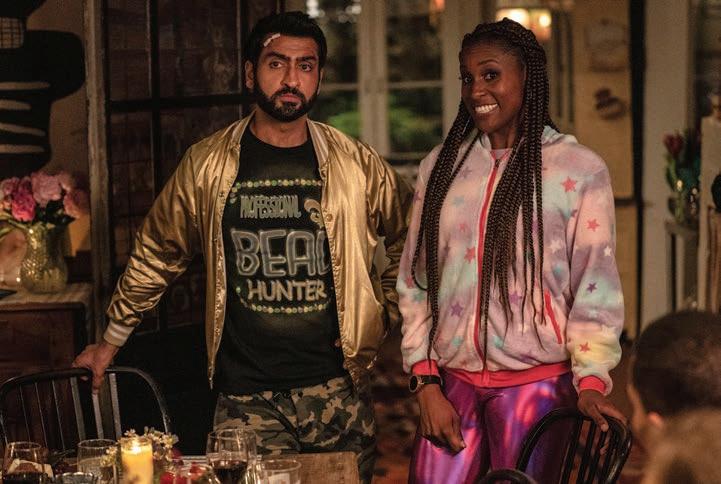
R Papicha










“Papicha’’ is Algerian slang that roughly translates to “pretty girl.” In Algerian writer-director Mounia Meddour’s invigorating feature debut, it applies to the free-spirited protagonist as well as her friends, all of whom embrace fashion and makeup as means of expressing their individuality in a society that Meddour characterizes as increasingly demanding homogenization among its female members. The word is also uttered by men as a pejorative term, and this double meaning reflects the complicated nature of a fraught period in Algerian history. Set in 1993 in the early days of the Algerian Civil War, the film follows Nedjma (Lyna Khoudri), a university student and aspiring fashion designer who enjoys going out with her friends and selling her designs. Throughout the film, violent attacks by Islamic rebel groups threaten the women’s
autonomy; one attack in particular motivates Nedjma to host a fashion show in which she modifies the haik, a garment that independent Algerian women were being compelled to wear by conservative factions. The film was banned in Algeria despite being selected as the country’s official entry for the Academy Awards—full of joy and despair, it reflects the intricacies of when it’s set as well as when it was made. In French and Ararbic with subtitles. —KATHLEEN SACHS 108 min. 5/29-6/11, Gene Siskel Film Center From Your Sofa
R Straight Up





Dialogue driven and slightly stylized, Straight Up offers a thoughtful look at the contemporary complexities of love in a way many recent rom-coms have tried but failed to do. This success is the obvious result of writer-director James Sweeney’s clear vision and fantastical yet authentic characters. Enter Todd (also Sweeney), an obsessive-compulsive gay twentysomething, and Rory (Katie Findlay), a whip-smart struggling actress. Both hyperarticulate and in search of more, they make a great pair on paper, but their relationship, while intellectually stimulating, is lacking one major component. Or is it? Straight Up invites viewers to question the elastic definitions of love and sexuality as the leads navigate “a love story without the thrill of copulation.” Can a relationship survive without sex? What if it’s a relationship with your soulmate? The movie doesn’t force-feed answers, a refreshing choice which solidifies Straight Up as a relevant and resonant rom-com. —BECCA JAMES 95 min. In wide release on VOD v

MAY 28, 2020 - CHICAGO READER 23 FILM
The Lovebirds
R READER RECOMMENDED b ALL AGES N NEW F
by WILLIAM BROWN and DOUG FREW directed by WILLIAM BROWN
773.281.8463 TIMELINETHEATRE.COM “THE THEATRICAL EQUIVALENT OF COMFORT FOOD” – BROADWAY WORLD THE HIT SHOW ABOUT CULINARY ICON JULIA CHILD “EXCELLENT, INTIMATE ... RESONANT WITH ATMOSPHERE” – CHICAGO TRIBUNE “A TOTAL DELIGHT FUNNY, TOUCHING, CHARMING AND AS ENJOYABLE AS AN EXQUISITE MEAL” – TALKIN’ BROADWAY WATCH FROM HOME! NOW STREAMING FOR A LIMITED TIME NOW – JUNE 7
Where indie music meets indie gaming
By LEOR GALIL
Ben Babbitt created the soundtrack for one of the most critically acclaimed indie video games of the past decade, but it wasn’t the fulfillment of a long-standing aspiration: he didn’t even consider the possibility of working in games till his second year in the sound department at the School of the Art Institute. And even then, it wasn’t his idea.
In 2011 his classmate Jake Elliott, who’d launched an embryonic game studio called Cardboard Computer, asked Babbitt if he wanted to compose something. Babbitt, now
31, didn’t play video games growing up—his parents wouldn’t let him—and he still hadn’t had much experience with them in college. But he knew music. His father, Frank, plays viola in the Lyric Opera Orchestra, and his mother, Cornelia, is a cellist with the Chicago Philharmonic. Babbitt rebelled as a preteen by playing pop-punk and emo, but his parents stayed supportive—when he was 16, they made guest appearances on the self-titled debut by his indie-rock band, This Is Cinema.
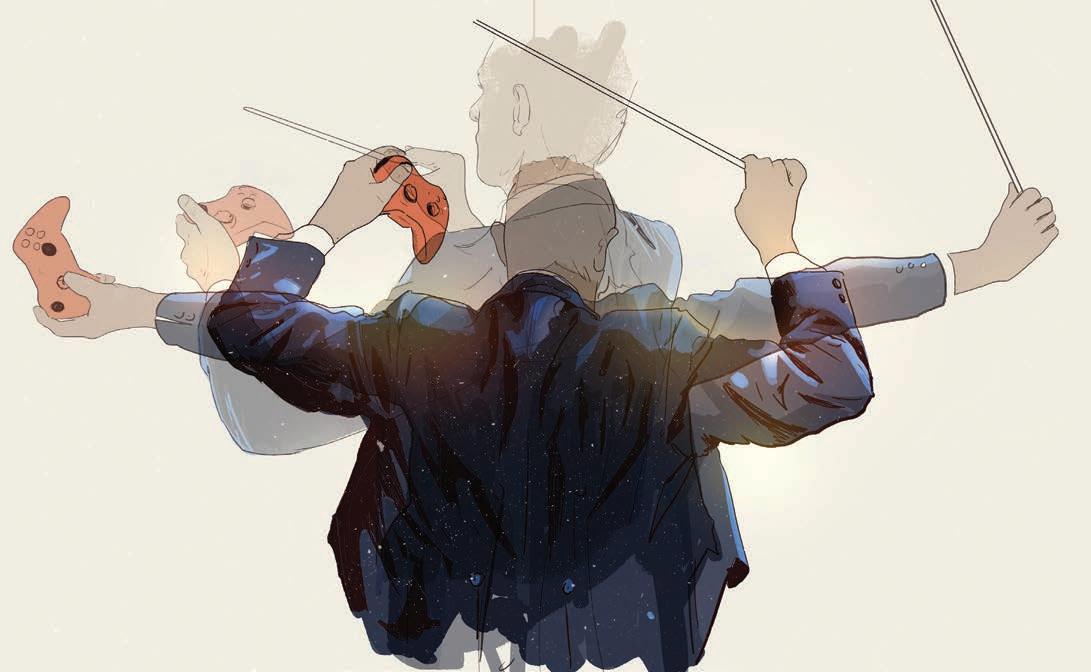
By the time Babbitt met Elliott in 2011, he’d become part of Chicago’s indie-rock
community. He lived in Logan Square, in a coach house behind Mark Trecka, front man of Pillars & Tongues, and Babbitt joined that mystical avant-folk group. Babbitt also turned his basement into a DIY show space called Hotel Earth, which most notably hosted Angel Olsen. Everything about Babbitt’s musical life up to that point had epitomized the typical Logan Square indie-scene experience—but then he played some of his compositions in an SAIC class called Electronic Writing. Elliott liked what he heard and o ered to hire Babbitt to soundtrack a game that he and an SAIC grad named Tamas Kemenczy had been working on. It was called Kentucky Route Zero , and it would end up consuming nine years of Babbitt’s professional life.
No one had ever commissioned Babbitt to write music, and he’d never collaborated with people who didn’t make music themselves. “I had no idea what I was getting into,” he says. “It was like, ‘Why wouldn’t I want to write a couple pieces of music for this thing and get paid a bit of money? That sounds cool.’”
The job turned out to involve far more than a couple pieces of music. As Kentucky Route Zero evolved, Elliott and Kemenczy realized it needed to be a multivolume game. They
GARRISON
released what became the first act in January 2013, and the fifth and final act came out January 28, 2020. Early in this protracted process, Babbitt became part of Cardboard Computer, and his work with the two developers became far more collaborative.
Kentucky Route Zero is a sprawling, surrealist point-and-click journey through backroads and subterranean tunnels, and it had earned extraordinary acclaim even before Cardboard Computer finished the game. Wired recently invoked “the next Great American Novel” to praise the complex storytelling of Kentucky Route Zero, whose elegantly blocky 3-D environments evoke the hard-to-pin-down feelings of economic and communal decline.
Babbitt’s music, which includes immersive ambient soundscapes and rustic folk numbers, plays a central role in the game’s world-building. Babbitt recruited his ex-girlfriend Emily Cross (of Cross Record) and his old Logan Square housemate Bob Buckstaff (of Mutts) to support his acoustic guitar on the folky material, which they recorded under the name the Bedquilt Ramblers; the band’s onscreen avatars appear as background characters throughout Kentucky Route Zero
I first heard of Kentucky Route Zero because of Babbitt’s music. In 2014, I found his score for Act III while doing one of my regular Bandcamp searches for music tagged “Chicago.” (Babbitt lives in Los Angeles now, and Elliott is in Elizabethtown, Kentucky, but Kemenczy—the only other employee of Cardboard Computer—remains based here.)
I was smitten with the song “Too Late to Love You,” whose whale-call vocals undulate atop chintzy lounge-music claves and thin, crystalline synths. Babbitt is singing, but he’s processed his voice to sound feminine, alien, and a little robotic—the song is credited to a game character named Junebug.
Babbitt has since made an entire album as Junebug, separate from his Kentucky Route Zero work. He finished the record in 2015, and it finally comes out later this year on an LAbased label called iam8bit, which specializes in video-game music. Vinyl preorders have already sold out.
Discovering Babbitt piqued my curiosity about other Chicagoans in his field. I wondered if there were places where composers go to meet one another and exchange ideas, the way game developers do. Columbia College and DePaul University o er game-design degrees—the latter advertises the program’s
24 CHICAGO READER - MAY 28, 2020 ll MUSIC JOHN
Chicago video-game composers talk about how they found their way into this strange and difficult business.
connection to Chicago indie company Young Horses, whose founders made the cheeky 2010 hit Octodad while at DePaul. Those schools provide built-in opportunities for in-person networking, and several other organizations—including Indie City Co-op and Cards Against Humanity—rent space to programmers and upstart game companies.
DePaul’s games degree includes a mandated sound-design course; Columbia requires a two-semester course sequence in video-game music as part of its Music Composition for the Screen MFA, and offers a survey course for composers in production for games, augmented reality, and virtual reality. But in general, game music is an appendage to game development, not a discipline with its own parallel infrastructure. Musicians usually collaborate with programming teams, rather than writing independently and then looking for buyers. And given that programming teams, like the one at Cardboard Computer, can be spread across the country, can a “scene” of game composers emerge anywhere but online?
My question brought me to Marc Junker, a game composer who lives in Vancouver, B.C., and works for a company in Aurora called the Yetee that specializes in video-game merchandise: T-shirts, plush toys, enamel pins, music, and more. Junker joined the Yetee team in 2014 and oversees its record label, which launched the same year. “A lot of the games we work with, they’re famous indie games,” Junker says. “They have huge audiences and their soundtrack is only available through Steam or on the artist’s Bandcamp, and it’s not necessarily getting the pomp and circumstance it totally deserves.”
Yetee Records has released more than 50 records and cassettes, including a seven-inch of music from Octodad sequel Dadliest Catch, a 12-inch of the score from 80s Konami arcade classic Gradius , and the soundtrack for TumbleSeed , a two-dimensional game in which a tottering seedling ascends a mountain pockmarked with holes and traps.
TumbleSeed is the creation of developers Benedict Fritz and Greg Wohlwend, who made it at the Cards Against Humanity incubator. Composer Joel Corelitz, who created the game’s soundtrack, met them there in 2014 and soon began collaborating. I found him, like Babbitt, by cross-referencing the “video game” and “Chicago” tags on Bandcamp. That technique also led me to two other Chicago- area composers, John Robert Matz and Charles Heinrich (who makes music as ec2151). Each of them took a different path
into the industry, which didn’t help my attempts to locate a community of composers, but they all had useful information to share about shaping the sound of video games.
Heinrich, 28, grew up in the Jefferson Park area and began his formal music education at age eight. He took ten years of piano lessons and also picked up cornet and trumpet, which he played in school jazz bands and orchestras. He also joined the marching band at the De La Salle Institute, where he graduated in 2009.
As much time as Heinrich spent on music, he also played a lot of video games. He grew up on Super Nintendo, then moved to the Nintendo 64, cycling through the system’s classic characters—Mario, Zelda, Kirby. In high school, as Heinrich began dabbling in composition, he dreamed of learning to shape the mood of a narrative with music. Even at that age, though, he was pretty sure the world of film music was out of his reach. “I want to create those emotional moments and help tell stories through sound,” he says. “Video games seemed like the avenue—that was a step I could take.”
In 2007, Heinrich started making rudimentary compositions with free multitrack music software—especially one developed by Russian composer Shiru8bit, which emulated the sound of the Sega Genesis. It reminded Heinrich of the Yamaha YM2151 sound chip, which he particularly liked—it was used in many 80s arcade games, and Heinrich’s “ec2151” alias is in part a reference to it.
As a student at Loyola, Heinrich bought a copy of FL Studio on sale. “I’ve been riding o of that $100 purchase now for over ten years,” he says. “That’s the best $100 I’ve ever spent yet.” He majored in history (he now works as an archivist for the Archdiocese of Chicago), and he confined music to his free time. He also did most of his gaming alone or with select friends, and he didn’t care for the online multiplayer experience. “I never got involved in meetups, competitive gaming, or gaming clubs,” he says. “I always preferred playing at my own pace, and I usually prefer singleplayer games to begin with.”
Heinrich has sought out communities of composers, though, and the closest he’s come to finding them has been in Internet forums—especially Reddit and OverClocked ReMix, a long-running site dedicated to video-game music. “The OC ReMix forum was very good for learning music production and compositional skills, as well as getting gen-
eral ‘business’ advice from composers who would go on to be bigger names in the industry (such as Andrew Aversa, alias Zircon, and Jake Kaufman, aka Virt),” he says. “Nowadays I mostly interact in chiptune-making communities, indie-game dev communities, and one very small community of rhythm-game/ indie-game composers.”
Heinrich began uploading his music to Soundcloud about nine years ago. His first paid opportunities came via blind messages from developers who’d found his Soundcloud page—that’s how he ended up working on the 2019 digital pinball game Demon’s Tilt. “Three of my four projects were from people reaching out, out of the blue: ‘I heard your music online, I’m interested in you working on my game,’” Heinrich says. “The first of those, the guy messaged me: ‘I’m working on this game, I really like the sound that you make’—referring to my chiptune music. ‘I think this would be a perfect fit.’”
Chiptune pays tribute to the sounds of outmoded video games, whose technological limitations severely restricted their music but also forced a lot of make-do ingenuity. By the late 90s, when John Robert Matz was old enough to start taking inspiration from games, those limitations were long gone; Lennie Moore’s music for the 1999 intergalactic adventure Outcast involved a choir and the Moscow Symphony Orchestra.
“It was the first score where I remember hearing an orchestra of this scope before—a live-performance capture that fits so well with the game,” says Matz, 34. “It sounded like a really, really good film score. As someone who’d been playing in orchestras in high school and was a huge film-score nerd, it was really kind of mind-blowing.”
In his early teens, Matz played cornet and trumpet in an ensemble for home-schooled students. In the mid-2000s he studied music education at Elmhurst College, focusing on brass and vocal performance. While he nursed his ambitions as a composer, he supported himself teaching. He found his window into game music after discovering a 2010 demo version of the multiplayer sci-fi game Artemis: Spaceship Bridge Simulator
Artemis developer Thom Robertson had o ered to send gamers a free copy of the finished game if they filmed themselves playing with friends, uploaded the video to YouTube, and sent him the link. Matz watched some of those YouTube videos and noticed that they were soundtracked with simple ambient tones
or borrowed music from Battlestar Galactica or Star Trek.
“It told me something very interesting, and playing the game confirmed it: there was no music in this game,” Matz says. “It’s a very neat game, and it has no music. I had this terrible, terrible idea—what if we film this, then I write music for this video and send it to the developer, who’s going to look at it anyway, and say, ‘Hey, if you like the music here, I wrote it. I couldn’t help but notice your game has no music. If you like this, I’d love to maybe work with you on this.’” Robertson hired Matz to create an orchestral score for Artemis, and it was added to the game in 2011.
“My first job was actually writing music for commercials—it took me a long time to find video games,” says Joel Corelitz. “I knew I wanted to do it; I just didn’t know how. Nobody has a road map.”
Corelitz, 40, had already spent about a decade in music when Sony enlisted him to compose for The Unfinished Swan , a 2012 adventure game about a child tracking down a renegade swan that’s escaped from a painting. Corelitz had been in the field since he graduated from the Oberlin Conservatory in 2002, first working for the commercial composition studio Steve Ford Music and then becoming a freelancer five years later. When Sony o ered him that first video-game job, he was in his early 30s.
“By the time I finally got to write music for a video game, I was ready,” he says. “I had enough iteration under my belt. I’d figured out how to take feedback, how to revise things, how to not take feedback personally, how to execute revisions quickly. I’ve gotten a lot of experience learning the skill that I think is the most important for any composer. It’s not about creating the best piece of music; it’s about creating the right piece of music.”
In 2018, Columbia College hired Corelitz to teach its two-semester course on music for games. Last year the Hollywood Reporter ranked Columbia’s program third in the world, behind Juilliard and the University of Southern California’s Thornton School of Music. Film is its central focus, but Corelitz has pushed it further into the world of videogame music.
None of the people I interviewed had anyone to show them how to become a professional video-game composer. But Corelitz can now show students that there is a pathway— and that it’s open to them.
MAY 28, 2020 - CHICAGO READER 25
MUSIC
“Most of the music that’s written over the course of a game’s development never gets heard by the audience,” Corelitz says. “Most of it ends up on the cutting-room floor, so to speak.”
One of the factors that makes game music so labor intensive is the necessity for it to respond to a player’s decisions. Matz makes the task sound like toddler-proofing a kitchen. “It’s a tricky thing to kind of wrap your head around sometimes, because it’s basically not unlike writing for film—or more accurately, not unlike writing for live theater productions, where things aren’t perfect. Except you’re writing for the least cooperative actor in existence, who is the player,” he says. “You are thinking about writing interactive music in a way that’s like, ‘OK, what’s the worst way the player can break this? What can they do? They could stop at this point and make a sandwich, and we have to make the music work.’”
Playing the game also helps a composer find the right tone for its music. As Corelitz explains, this also takes time. “You have to learn about the lore of the game, the story, the characters, the way the game feels,” he says. “If you’re writing a piece of music for a certain place in the game, you have to figure out where that piece lives in the game, why it’s being used there, and what it’s communicating. The only way to do that, I think, is to just live with it for a while.”
Every composer I interviewed echoed Heinrich’s rule of thumb: “The client’s needs come first.” That can require composers to leave their comfort zones or work outside styles they find personally interesting. It’s di cult enough to make a piece of interactive mood music interesting in a vacuum, and taking into account the gameplay and the designers’ tastes makes it even trickier.
The frequently protracted process of writing music for a game does have an upside: it gives composers lots of time to refine the textures of their soundtracks. As Babbitt worked on Kentucky Route Zero, he found inventive ways to broaden his palette. While he was writing for Act II, for instance, his mom put him in touch with the musical director of Highland Park Presbyterian Church so he could use its organ. “Probably the most extreme example was attempting to learn the theremin for the fourth chapter of the game— it’s incredibly di cult,” he says. “I got one at Guitar Center, basically got what I needed out of it, and returned it.”
“Video-game music has always been, in my opinion, in a limbo state,” says Marc Junker of Yetee Records. “When I was younger, I would look really, really, really deep for downloads of all these Japanese CD releases of, like, orchestration for Final Fantasy soundtracks—like Final Fantasy IV: Celtic Moon, this Celtic chamber ensemble recording of the Final Fantasy IV soundtrack. It was the coolest thing ever. In terms of where you’d find that, outside of some Angelfire, Geocities zip file downloads— it was impossible. Nowadays it’s obviously better than that.”
Yetee has helped improve the availability of video-game soundtracks, in the process demonstrating the healthy overlap between gamers and collectors of vinyl and cassettes. For its vinyl release of Corelitz’s TumbleSeed music, the label provided all the ideas for art and presentation. “They really understand the audience for vinyl, especially for video-game vinyl,” Corelitz says. “They basically said, ‘We’ll do this—edit down 40 minutes of material, and we’ll throw it on a piece of vinyl and sell it.’” In 2018, Yetee released the Tumble-
Seed soundtrack on a picture disc emblazoned with the game’s titular seed. Yetee’s catalog also demonstrates the overlap between video-game music and more conventional pop. It includes music from Junker’s vaporwave project, R23X—his EP Re-Gen came out in 2017 on picture disc and VHS. The label’s 2018 release Synthetic Core 88, issued on vinyl, cassette, CD, and 3.5-inch floppy diskette, embodies an even more intimate symbiosis between video-game music and contemporary electronic music: it presents itself as a classic early-90s video-game soundtrack, but the game doesn’t actually exist. The music is the work of Chicago producer and composer Equip, who’s since released an album via the 100% Electronica label run by New York cult favorite George Clanton.
Video-game music obviously communicates with adjacent pop styles, so I asked Babbitt whether he carried over anything from Kentucky Route Zero when he contributed synths, string arrangements, and other auxiliary instrumentation to Angel Olsen’s recent fourth album, All Mirrors . “I have my aesthetic interests and tendencies,” he says. “I worked on both projects, so they come through in some way.”
Corelitz knew he wanted to make music for video games before The Unfinished Swan , but he also knew he wanted to work in more than one medium—and be able to call his own shots. “I wanted to find a job where I could experiment with lots of di erent styles, where I could do it by myself, in a room by myself,” he says. “For me, that’s where I feel most at home. It’s like a lab.” I approached this story looking for a community of Chicago game composers, and though I found one, it’s impossible to separate from the community of Chicago game devel-
opers. And since composition work can be siloed—Corelitz does in fact work in a room by himself—location doesn’t necessarily matter. Matz has done much of his professional networking online: “I definitely lurked around the Northern Sounds forums back in the day, picking up some early knowledge,” he says. “But mostly I frequent various Facebook groups for game-audio folks nowadays. Great folks, useful sounding boards, and solid advice.”
Matz met his friend Gordon McGladdery, director and composer for Vancouver studio A Shell in the Pit, at the 2014 Game Developers Conference in San Francisco. McGladdery ended up hiring him to make the music for the 2016 adventure game Fossil Echo . He’s currently composing for games being developed by teams based in San Francisco, Vancouver, and Bordeaux, France.
Indie games can be developed anywhere, but it certainly doesn’t hurt to have colleagues in your backyard. To push back against the atomized nature of the business, Matz is helping build more local infrastructure for video-game composers. He’s a collaborator in Chicago collective Unlock Audio, which outsources sound and voice-over work for game developers from all over.
Corelitz may not share his workspace, but he appreciates community. For much of his life, he had wanderlust, and often imagined living anywhere but Chicago. But while working on TumbleSeed , he became a regular at the Cards Against Humanity incubator, where the developers rented space—he liked talking shop and meeting other game designers. “That’s when Chicago really felt like home,” he says. “I just stopped wondering what it would be like to live somewhere else.” v
@imLeor
26 CHICAGO READER - MAY 28, 2020 ll
MUSIC continued from 25 To all the essential workers in Illinois keeping us healthy and safe, thank you. IllinoisLottery.com
Thomas Comerford, filmmaker and singer-songwriter
inspired by so much music that’s come out of here—it was exciting. So I arrived here in 1999, and that’s also when I started working. I’ve been, I guess, an artist first and also working, because I’ve never held a full-time gig. I teach film and video production and history, looking at nonfiction movies . . . a range of different things.
Within that first year of being here, I played my first live show, going under the name Kaspar Hauser. I’d been real shy about performing in front of people, so that was a big plunge for me. I had to sort of kick myself in the butt to do that. That’s when I really started to get excited and inspired by the possibility of not just the writing process but also bringing the songs to various people to work on them together. To me that’s kind of the magical part, bringing people into it and then seeing what happens.
I mostly grew up in northeast Ohio, in the Cleveland area. My parents were from that area, and we ended up landing there when I was six. Then I got out of there and moved around a lot in my early 20s.
“Our Valley” was a song that happened very quickly. I was in Cleveland around Christmastime last year visiting my dad. We went on this walk together in this area called the Valley. It’s this series of parks and whatnot. My dad walks a lot, and we went out for a walk there, along the Rocky River. It was just the two of us. My mom passed last June, so it’s been a difficult year.
By early April, I really wanted to try to find a way for us to work together. I’m fine with the format of streaming concerts, but I’m not really interested in doing a solo show that way. I think it’s hard for me to play completely alone. I just want to hear more stuff going on around me. And I knew it would be difficult to try to do something live across multiple feeds, because there’d be a time lag.
The group that I did the single “Our Valley” with (with two exceptions) are people that went on the road with me last summer, and then they’ve been sort of my main crew since then. I thought, I am pretty comfortable with overdubbing. If I record this with a click track, everybody can add their pieces and then we’ll see how it goes. As people started adding their parts, I was really taken with how things were coming together. So we mixed it and thought it merited an official release.
I thought it might be cool to have a video to go along with it and asked the band if they could shoot video of themselves performing. By the end of March, I had participated in a lot of Zoom meetings, and I liked this idea that even though we can’t be together in the same place we can at least have images of people performing the song—kind of coming together musically.
Thomas Comerford, 49, is a filmmaker and singer-songwriter who started the group Kasper Hauser in 1999. He’s currently mixing his fourth solo album, and this week he releases the single “Our Valley,” written late last year and recorded during the Illinois stay-at-home order in March and April.

Before I came to Chicago, I lived in Iowa City for three years. I was in an MFA program there and I studied film, but I was also interested in audio production. I had been writing music for a while. I started writing songs when I was in college in upstate New York—started in ’88 and was out by ’92. I had a couple of groups, but some-
times just the idea of putting something in front of people and having it be judged was terrifying.
I would trade tapes with friends. Actually a big inspiration for me was this singersongwriter named Lisa Marr, of the band Cub. I became buddies with her because one of the places I lived before that for a little while was Las Vegas—that was a pretty cool little music scene there. I met Lisa at an instore that Cub did in Vegas, and we got along really well. I would write stuff and record on a handheld tape recorder, and I would send it to her and she would send a tape back or some of her demos or whatever.
But coming to Chicago, and having been
It’s hard to articulate exactly what happened on the walk, but I guess I just felt very moved. I also thought about this idea of a valley as a safe place but also kind of a low place. I think I started writing it while we were walking, actually. I had some of this imagery, and then I started playing around on the guitar. I remember dinner was being prepared, and I was quickly trying to just get some stuff figured out and recorded so I didn’t forget anything. I was late arriving to dinner because of that.
And then I just had a very rough demo, pretty much by New Year’s. I shared it with the live group, and we learned it and played it at a couple of shows in January and February of this year. We actually played a show on March 13 at the Hungry Brain, and at that point we were wondering if we should do that. It was basically the last night—everything kind of shut down after that.
Originally the song was going to be called “The Valley,” and then I was thinking about walking with my dad and the experience we were sharing while grieving. He and my mom had walked those very same paths for the last 50 years together. I saw a connection as far as this space or a state of mind that is shared.
I’ve gotten so busy with the production of my own music in the last ten years. I still keep my feet in the media stuff, teaching and making music videos. I was about to start working on one for Azita, actually, but two days before the big shoot—that’s when everything kind of fell apart. We’re still going to make that video, but I’m just not sure when. v
@hollo
MAY 28, 2020 - CHICAGO READER 27 MUSIC
THOMAS COMERFORD
CHICAGOANS OF NOTE
“To me that’s
kind of
the
magical part,
bringing the
songs
to various people to
work on them together.” As
told
to SALEM
COLLO-JULIN
pleaserecycle thispaper
Harvey rapper Ty Money bids adieu to the career-defining mixtape series Cinco de Money
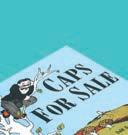
Recommended


soundcloud.com/moneysbmg/sets/cinco-de-money-5

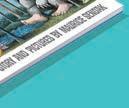
ON MAY 5 HARVEY RAPPER Ty Money released the fifth and final entry in his careerdefining mixtape series, Cinco de Money , which he launched in 2015. Each volume has showcased what makes Money stand out: his vivid narratives of street life, freighted with pathos, delivered in a rush of syllables that cuts through the instrumentals like a soupedup car racing through a mountain tunnel. Cinco de Money 5 (self-released via SBMG LLC) highlights Money’s grasp of pop music:
he dabs his clean, straightforward hooks with Auto-Tune, and on “Whoa Whoa” he delineates the honeyed sung chorus from the burly rapped verses with a precision that confirms the enduring magic of the old-school industry approach to pop songwriting. Money’s pop proclivities bear great fruit: his half-sung hook on “Whateva” manages to sound triumphant and sullen by turns, and these dueling moods create a strange, magnetic euphoria that only Money can capably deliver.
—LEOR GALIL
Charli XCX, How I’m Feeling Now Atlantic

store.warnermusic.com/atlantic-records/ artists/charli-xcx.html



Charli XCX has no chill. The pop star has spent much of her time during the pandemic making a new album, How I’m Feeling Now , which came out May 15. The record’s 11 bittersweet electropop tracks document the minutiae of her life under lockdown, including her conversations with her therapist, her online shopping expenditures, her experiences sheltering in place with her boyfriend, and her intense nostalgia for prepandemic partying. Charli also churned out supplementary content through every step of her process, including Instagram Live songwriting sessions and a delightfully DIY green-screen video for the love song “Claws,” and this transparency made the project feel like performance art. Concert venues may be closed, but Charli invited her fans to watch and provide feedback over social media as her songs, themes, and visuals took shape in real time. Her lyrics o en feel like journal entries: she kicks off “Anthems” with details of a mundane morning (“Wake up late / Eat some cereal”) before breaking into a yearning chorus about the things she misses most while confined to her home, including late-night adventures and exploring New York. Though musicians will likely create a lot of quarantine art in the months and years to come, the genius of How I’m Feeling Now lies in its immediacy—Charli has channeled the current chaos into a fully realized album in a little more than five weeks.
—MEGAN KIRBY
Damacy, Sun Spot EP Tanuki








damacymusic.bandcamp.com/releases



Multi-instrumentalist Yuto Winston Kanii moved to Chicago a couple years ago, and he’s kept busy with his easygoing solo indie-pop project, Damacy. He grew up in the Louisville area, where he began playing in bands in high school, and by his early 20s he’d achieved a smidgen of local popularity as the front man for a good-natured indierock band called Ranger; their recordings are endearingly rough around the edges, and they
assembled their 2013 debut album, The Bard, out of jam sessions recorded in an abandoned candy factory. Now 28, Kanii hasn’t found any Chicago collaborators since settling in Logan Square, but Damacy’s recent debut, Sun Spot EP (on his own Tanuki label), fits comfortably into the city’s contemporary indie-rock landscape: his laid-back, tropical vibes mesh well with the serene style loosely mapped out by the likes of Paul Cherry, Whitney, and Divino Niño. Kanii’s gentle vocals and sweet slacker guitar riffs on “Gvn n’ Lvn” feel like a gentle ocean breeze—and given that actual ocean breezes are out of reach for most us now, Sun Spot is the next best thing.
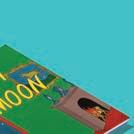
 —LEOR GALIL
—LEOR GALIL
K-Rad, 127When Self-released padk-rad.bandcamp.com/album/127when
Since 1996, Chicago electronic producer Christopher Grabowski has experimented with IDM under the name K-Rad. The name initially represented a small, loose collective with Grabowski, Joe Hahn, and Mark Hardy at its center; all three producers worked on K-Rad’s debut for the Someoddpilot label, 2002’s Deli Mood Spot Since then Grabowski has made K-Rad his solo project, and while he’s sometimes issued collaborations with other producers as K-Rad singles or full-lengths, in recent years he’s made all the material on his own. Grabowski began recording 127When on March 26, about a week a er Illinois began sheltering in place, and he wrapped it up two days before its May 1 release. He intended the album to be an immersive experience, and he gave himself a running time of more than two hours to achieve that goal; he uses modular synthesizers to build serene moods, adding an ever-shi ing matrix of fi zzy, delicate percussion to provide a constant hum of energy. Grabowski also brought back original K-Rad collaborator Hardy to play sitar on “127_PouringOutDrumulation,” and its reverberating strings send gentle ripples through the track’s tight, rubbery bass loops and brittle percussive chatter. With any luck, the constantly evolving arrangements on 127When will occupy enough of your mind to shut out the hellscape that inspired Grabowski to make the album in the fi rst place.
—LEOR GALIL



28 CHICAGO READER - MAY 28, 2020 ll
Ty Money, Cinco de Money 5 SBMG LLC
PICK OF THE WEEK
and notable albums and critics’ insights for the week of May 28 MUSIC
RYAN LOWRY
b ALL AGES F
When you want to put together an improvising ensemble whose interactions will be unpredictable as well as satisfying, it helps to recruit someone who has your back and someone else who isn’t afraid to push the music somewhere you didn’t think it would go. For one night in December 2018, Chicago alto, tenor, and baritone saxophonist Dave Rempis convened a personal dream team, full of musicians who can play both roles: Norwegian drummer Paal Nilssen-Love is Rempis’s longstanding collaborator in the ferociously aggressive trio Ballister, but his attention to detail and textural variety comes in just as handy for nurturing slow-building tension. Cellist Tomeka Reid and double bassist Brandon Lopez have each worked with
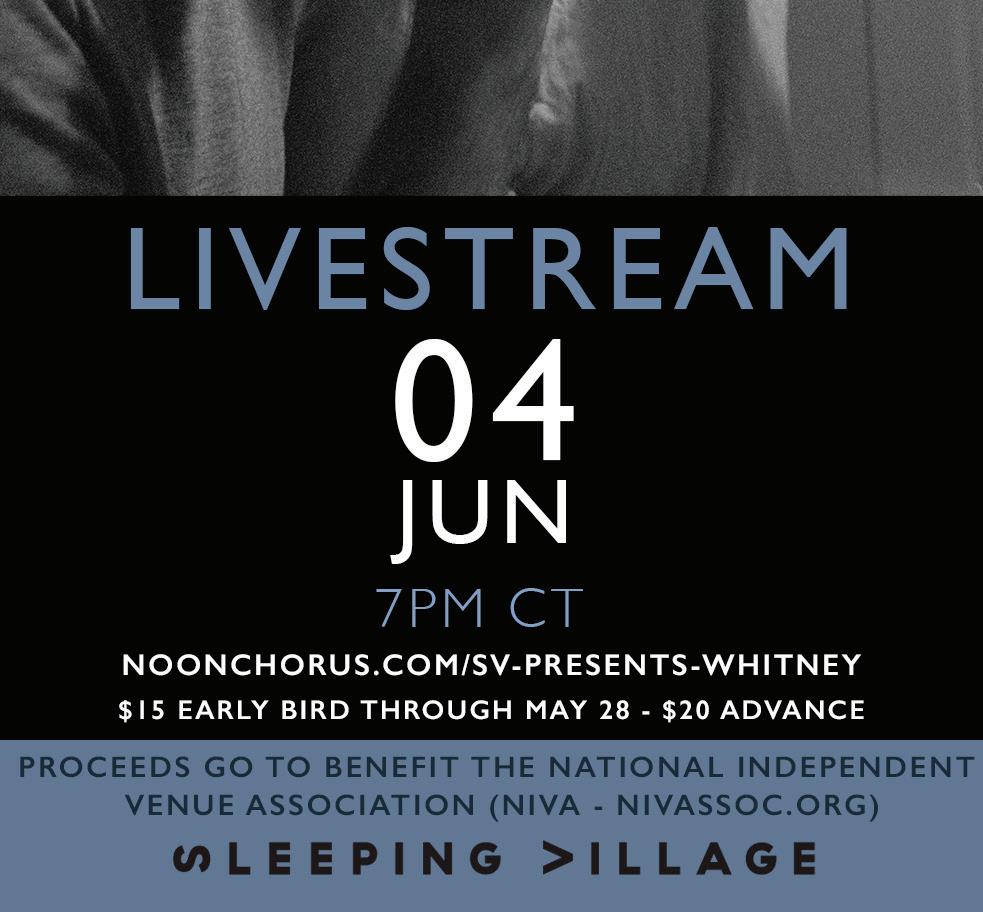

MUSIC
Rempis in combos that mix classical sonorities with mercurial shi s of mood. And multi-instrumentalist Joe McPhee, who turned 79 one month before the concert, can transform the emotional tenor of an entire performance with a few grave notes. This splendid CD, which follows an LP-only first volume recorded at the same show, contains plenty of high-energy blowing, but it’s o en the quiet, contrasting gestures hidden with the storms that make it so compelling.
—BILL MEYER
Sonic Boom, All Things Being Equal Car Park
store.carparkrecords.com/products/662649sonic-boom-all-things-being-equal
This might go down in history as the year everything got completely fucked forever, but some people will also fondly recall it as the year when Sonic Boom finally released his glorious second LP, All Things Being Equal —three decades after his solo

MAY 28, 2020 - CHICAGO READER 29
Dave Rempis, Joe McPhee, Tomeka Reid, Paal Nilssen-Love, and Brandon Lopez, Of Things Beyond Thule Vol. 2 Aerophonic aerophonicrecords.bandcamp.com/album/ of-things-beyond-thule-vol-2
Dave Rempis CENGIS YAR
MUSIC
debut. Peter Kember, the multi-instrumentalist better known as Sonic Boom, made Spectrum way back in the innocent age of 1990, just before the dissolution of his long-running alt-rock outfit Spacemen 3. “Spectrum” also became the name of Kember’s next psych-leaning band, which by the mid90s had morphed into his primary solo outlet; at the same time, he explored more expansive sonic territory with the loose collective EAR (Experimental Audio Research). Both projects have slowed down considerably in recent years, making way for relatively fleeting collaborations and production work, lending some 90s psych authenticity to the current generation of indie scenesters. I’d all but given up on ever hearing the old classic Kember sound again, so it’s pretty astonishing that All Things Being Equal picks up more or less where he left off on Spacemen 3’s final LP, 1991’s Recurring—created while he was feuding so bitterly with the band’s other creative engine, Jason Pierce (later of Spiritualized), that they made the album by each writing one side of it and recording separately. On Spectrum Kember had flirted with electronica while retaining his guitar-stormin’ edge, but on Recurring he revealed a new synthy sound indebted more to Kra werk than to Spacemen 3’s nods to the Velvet Underground and the 13th Floor Elevators. The initial backing tracks for All Things Being Equal were recorded in 2015, and Kember considered releasing them as instrumentals after encouragement from Stereolab’s Tim Gane. He never did, though, and three years later, Mr. Boom felt the need to “ice the cake,” as he put it: a er moving to Portugal in late 2016, he’d started spinning 60s soul and pop records, and their catchy vocal vibes appear throughout the new album. But Sonic also does classic Sonic, which he clearly defines on opener “Just Imagine,” a mission statement of a song that features gurgling synths,
Speak & Spell-style bloops ’n’ bleeps, and the drony, catchy vocals Kember has used since day one of his psychedelic career. He consistently evokes the groovy sounds and shiny machine music of a 1960s vision of the future, and the womblike “Just a Little Piece of Me” pulses like a computer on Star Trek (or like the chill-out room at a 90s rave) while recalling the shoegaze era that S3 helped inspire. Drum machines invade “The Way That You Live,” which mines the new-wave territory of early OMD or New Order and adds rippling ambient accents reminiscent of the 1960s experiments of the BBC Radiophonic Workshop. On “My Echo, My Shadow and Me,” Sonic brings back his trademark spoken-word ruminations, sounding either like the bored headmaster at a British school in outer space or like a malfunctioning B-movie supercomputer that’s somehow become sentient—when he exclaims “I am the fire,” you’re inclined to believe him. The Boomster says he was influenced by the numerology of the year 2020, and the songs on All Things Being Equal gesture toward the mathematical interconnectedness of human consciousness, memory, space, consumerism, and much more. The album is not only a reflection of the strange moment in which we find ourselves but also a timeless, retrofuturistic pop masterpiece that music scholars should be studying and deciphering for (fingers crossed) generations to come.
—STEVE KRAKOW


Various Artists, Buds Volume 1 Rosebud Allday rosebudallday.com
On its first compilation, Buds Volume 1 , Chicago label Rosebud Allday showcases the talent of its roster and its friends from the local scene. Founded in 2018 by Bill Ocean and producer Jayson “Jsun”
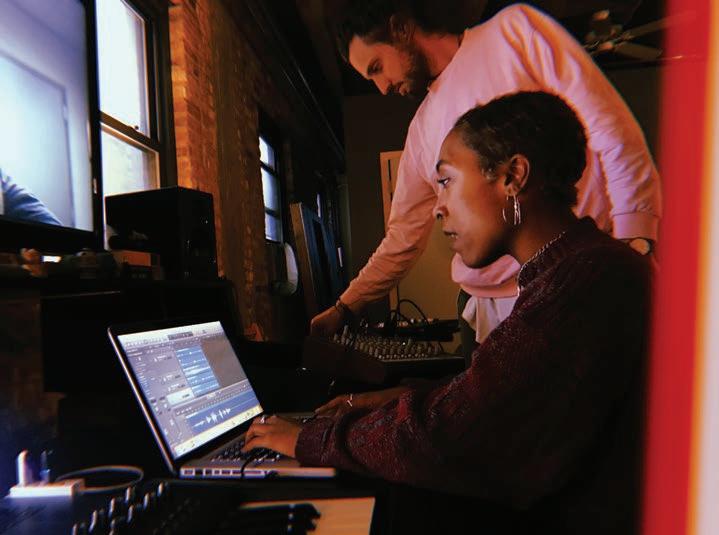
30 CHICAGO READER - MAY 28, 2020 ll
Rosebud Allday label cofounder Jsun Rose (standing) with Drea the Vibe Dealer BILLY GIANNOPOULOS
continued from 29
Find more music reviews at chicagoreader.com/soundboard Whitney Wasson Instagram: @soberrabbit Twitter:@boozetornado • Website:thewhitneywasson.com 22 ChicagoReaderColoringBook Proceeds will be split between the Reader and the more than 50 artists who contributed illustrations. $30 for PDF download $45 for limited edition printed book and PDF download Or send checks to: Chicago Reader Suite 102 2930 S. Michigan Avenue Chicago, Illinois 60616 For copies of this book, either in PDF form or as a printed book, see: chicagoreader.com/coloringbook Provide your name and mailing address and say this is for a coloring book on the memo line.
Rose, Rosebud Allday specializes in the overlap of pop, hip-hop, and R&B; its sunny sounds recall Chicago neosoul groups such as the Social Experiment and the O’My’s or the early work of Los Angeles collective Odd Future (minus the menace). The label operates a recording studio in Ravenswood that’s temporarily closed due to COVID-19, and the ten-track Buds compilation is intended as both a stopgap release and an introduction for the uninitiated. Wyatt Waddell’s “If I Don’t Want You” pairs the singer’s falsetto fl irting with up-tempo Stevie Wonder- inspired keys, while Blake Davis’s “Persuade Me” features a busy hip-hop beat that chops up string flourishes, horn stings, and vocal phrases. Not all the songs are high energy: Drea the Vibe Dealer goes for something more minimal on “Aline,” building the track from little more than distorted guitar and lethargic drum programming. A few cuts feel like they would’ve been released in different forms if the collective hadn’t been forced into isolation: Jsun Rose’s hip-hop instrumental “Strange Times,” which features trumpeter Sam Veren and producer Lil Smoke, seems incomplete, like it needs a striking vocalist such as Waddell or squeaking rapper Manny 10x (also a Rosebud Allday artist). But while Buds sometimes feels sketchy, it’s more than the sum of its parts; it’s a compelling gateway to the label’s sound, and the way it re-creates the mellow high of sitting in on a crowded jam session is especially welcome while the Rosebud Allday studio can’t safely reopen. —JACK RIEDY
Xibalba, Años en Infierno Southern Lord
xibalbasl.bandcamp.com/album/a-os-en-infierno











Named a er a Mayan term that roughly translates



















to “place of fear,” Southern California trio Xibalba have been blending strains of metal and hardcore for nearly 14 years. They’ve increasingly leaned into their Latino heritage (they sing in both Spanish and English) and their death-metal influences, while expanding into new moods and song structures; on the 2015 album Tierra y Libertad they deviated from their relatively compact crushers for sprawling closer “El Vacio.” On their new fourth album, Años en Infierno, Xibalba continue down their ferocious, groove-infested path to explore suffering, despair, and man’s search for meaning on personal, spiritual, and societal levels. “Santa Muerte” grinds along like one of Bolt Thrower’s best tracks as front man Nate Rebolledo questions those who judge or dismiss others’ pain until it grows too dire to ignore. The instrumental that follows, “Saka,” adds to the intensity, with powerful percussion girded by stony guitar chords and pummeling breakdowns.

As they did for Tierra y Libertad, Xibalba save some of their most evocative songwriting for last. Delivered in two parts, album closer “El Abismo” (“The Abyss”) ruminates on the journey of the soul during an encounter with death: it establishes a contemplative, doomy soundscape, spins into rougher terrain, and then slowly culminates with a triumphant serenity. Interpret it how you want, but with Xibalba, you can be sure no one’s going “gently” into any kind of night. In an April interview with Hard Noise, Rebolledo addressed rumors that Xibalba are planning a hiatus following the promotional cycle supporting the album’s release: “As for the future, if it matters, we may play, but I wouldn’t count on it,” he said. The pandemic has sledgehammered us all, and whether Xibalba choose to hang up their hats now or celebrate Años en Infierno with fans in person down the road, they’ve at least gi ed us a tool to help us weather the storm.
—JAMIE LUDWIG v


MAY 28, 2020 - CHICAGO READER 31
MUSIC
Xibalba
NATE REBOLLEDO BIT.LY/GOOSEDELIVERS Chicago's Free Weekly Since 1971 We Couldn't Be Free Without You— Support Community Journalism
Sima Cunningham’s greatest moment in Chicago music history
The Ohmme cofounder spent years in a children’s choir that sang for the Dalai Lama—and she hopes to help such groups continue nurturing young musicians.
By SIMA CUNNINGHAM AND AYANA CONTRERAS

Not only is 2020 the Year of Chicago Music, it’s also the 35th year for the nonprofit Arts & Business Council of Chicago (A&BC), which provides business expertise and training to creatives and their organizations citywide. To celebrate, the A&BC has launched
the #ChiMusic35 campaign at ChiMusic35. com, which includes a public poll to determine the consensus 35 greatest moments in Chicago music history as well as a ra e to benefit the A&BC’s work supporting creative communities struggling with the impact of COVID-19 in the



city’s disinvested neighborhoods.
Another part of the campaign is this Reader collaboration: a series spotlighting important figures in Chicago music serving as #ChiMusic35 ambassadors. This week, we hear from Sima Cunningham, cofounder of avantrock band Ohmme and a busy collaborator with Chicago artists across genres—among them Charles Rumback, Twin Peaks, Jeff Tweedy, and Chance the Rapper. Ohmme’s new album, Fantasize Your Ghost, drops June 5 on Joyful Noise Records.
This interview was conducted by Ayana Contreras, who’s a DJ, a host and producer at WBEZ radio, and a columnist for DownBeat magazine.
Ayana Contreras: What’s one of your favorite Chicago music moments?

Sima Cunningham: I was in the Chicago Children’s Choir when we sang for the Dalai Lama at Millennium Park. That was in 2007, one of my last years in the choir. I was in it from age six until I was 18.
I remember at that time, my mom was battling cancer (which she defeated), and she had gotten deep into Buddhism through her time with that. So I was learning a lot about the Dalai Lama with her, and then he came to Chicago. We were singing all of these very peace-inspiring songs. I think we sang “I Need You to Survive” [by prominent New York pastor and gospel artist Hezekiah Walker].
Then I remember the Dalai Lama came back and touched a bunch of our hands, and I got to touch his hands too. I remember feeling so moved by it, and feeling that “this is what music can do—bring people from across the world together.”
That felt like a really special moment in Chicago music history: the Dalai Lama was there,
and kids from all over the city were a part of that.
What makes Chicago such a hotbed for musical invention, and a place so full of really exciting collaborations?
I think we have exceptional programs in Chicago that really work on bringing kids from different parts of the city into one space together. I know it happens some in other cities, but it’s done so intentionally and overtly here.
The Chicago Children’s Choir started as a civil rights organization to bring kids from around the city together. Gallery 37, the Old Town School of Folk Music’s open mike—so many of my friends were involved in programs like these. And Citywide Jazz, which was a big deal when I was in high school. I guess it’s the magnet idea.
I think that just carried over into my generation that got to grow up with all of those programs. And those programs have played a huge role in making this exploding music scene that’s happening now.
That’s definitely something to think about in this moment, because a lot of these same organizations are trying to figure out how to pivot . . . and it’s the same for you as a musician.
Yeah. I was just on a call with a bunch of alumni and the directors of the Chicago Children’s Choir, trying to figure out some ways to help them move through this time. The top of the list of “This cannot happen” is people singing in a room together. We’ve got to figure out a way to give that moment back to kids in Chicago, because it’s really important. It’s important for people to get out of their world, and for some kids to get out of their family space and feel they have chosen family around the city that they can collaborate with. v
32 CHICAGO READER - MAY 28, 2020 ll MUSIC
PHOTO BY CJ HARVEY
#CHIMUSIC35
CHICAGOREADER.THREADLESS.COM CHICAGO READER MASKS










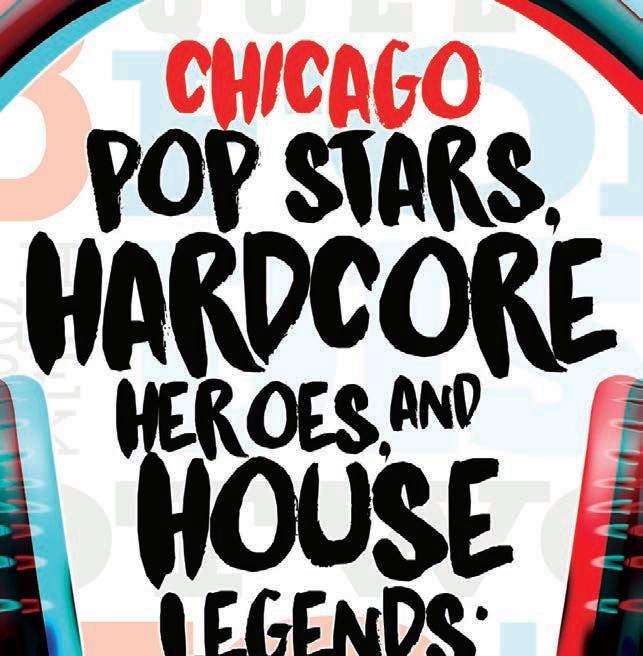



MAY 28, 2020 - CHICAGO READER 33 chicagoreader.com/leorbook Donate to get Leor Galil's best articles over the past 10 years of Chicago music!
EARLY WARNINGS
Aubrie Sellers, Lillie Mae 8/26, 7:30 PM, SPACE, Evanston, canceled b
Steely Dan, Steve Winwood 6/25/21, 7:30 PM, Hollywood Casino Amphitheatre, Tinley Park, rescheduled; tickets purchased for original date will be honored b
The Weeknd, Sabrina Claudio, Don Toliver 6/21/21, 7 PM, United Center, rescheduled; tickets purchased for original date will be honored b Nilüfer Yanya 6/15, 8:30 PM, Lincoln Hall, postponed until a date to be determined, 18+
UPCOMING
Adult., Body of Light, Plack Blague 11/13, 10 PM, Empty Bottle
AJJ, Xiu Xiu, Emperor X 3/12/21, 7 PM, Metro, rescheduled b
NEW
All Dressed Up & Nowhere to Show featuring S.G. Goodman 6/9, 7 PM, livestream at facebook.com/evanstonspace/ live F
Amorphis, Entombed A.D., Nervosa 9/25, 7:30 PM, the Forge, Joliet b Albert Cummings 9/10, 8 PM, SPACE, Evanston b Dustbowl Revival, Smooth Hound Smith 8/16, 8 PM, SPACE, Evanston b East Pointers 9/4, 7:30 PM, SPACE, Evanston b
FitzGerald’s presents Stay-atHome Concert Series featuring Paul Cebar 6/6, 4 PM, traveling through Berwyn and concurrent livestream at facebook.com/ fitzgeraldsnightclub F
Steve Grimmett’s Grim Reaper, Skull Fist 10/11, 7 PM, the Forge, Joliet b Josh Kelley 11/18, 8 PM, City Winery b Lady Lamb 2/15/21, 8 PM, City Winery b
Mörk Gryning, Arsantiqva, Well of Night 5/2/21, 8 PM, Live Wire Lounge
Music Friendly Distancing featuring Cafe Racer 5/27, 5 PM, livestream interview and DJ session at emptybottle.
com F
Sinead O’Connor 8/18/218/21/21, 8 PM, City Winery b

Polyvinyl Power Hour featuring Somebody Still Loves You Boris Yeltsin, Of Montreal, Diane Coffee, Post Animal, and more 5/29, 5 PM, broadcast of performances made for Audiotree at twitch.tv/ audiotreemusic F
Chuck Prophet & the Mission Express 8/14, 8 PM, SPACE, Evanston b
Tom Rush 11/19, 8 PM, City Winery b
Dave Specter 8/17, 8 PM, SPACE, Evanston b Sunshine Boys, Bobbleheads 9/5, 8 PM, SPACE, Evanston b
UPDATED
NOTE: many concerts have been canceled, rescheduled, or postponed in light of ongoing concerns about COVID-19. We suggest that you contact the point of purchase if you need information about exchanges or refunds.
Airborne Toxic Event 3/11/21, 7:30 PM, the Vic, rescheduled; tickets purchased for the original date will be honored b Barenaked Ladies, Gin Blossoms, Toad the Wet Sprocket 6/28/21, 7 PM, Chicago Theatre, rescheduled b Brevet 8/5, 8 PM, Beat Kitchen, rescheduled, 17+ Brit Floyd 8/14/21, 8 PM, Chicago Theatre, rescheduled; tickets purchased for original date will be honored b Russell E.L. Butler, Justin Aulis Long, Grey People, Nishkosheh 6/20, 10 PM, Smart Bar, postponed until a date to be determined Slim Cessna’s Auto Club, Bellrays 5/7/21, 8 PM, Subterranean, rescheduled Chicago, Rick Springfield 8/1, 6:30 PM, Allstate Arena, Rosemont, postponed until a date to be determined b Cub Sport 6/13, 8 PM, Schubas, canceled b Dirty Projectors, Tasha 6/3, 8:30 PM, Thalia Hall, postponed until a date to be
determined, 17+ Doobie Brothers, Michael McDonald 8/29/21, 7:30 PM, Hollywood Casino Amphitheatre, Tinley Park, rescheduled b Glenn Underground, Leja Hazer, Katharine Hepburn, Roger That 8/27, 10 PM, Smart Bar, postponed until a date to be determined F Hot Mulligan, Heart Attack Man, Fredo Disco, Super American 12/6, 6 PM, Bottom Lounge, rescheduled b Eric Hutchinson, Jeremy Messersmith 6/5, 8 PM, Bottom Lounge, postponed until a date to be determined, 17+ James Taylor & His All Star Band, Jackson Browne 6/9/21, 7:30 PM, United Center, rescheduled b Le over Salmon 6/11, 8 PM, SPACE, Evanston, canceled Bruno Major 10/5, 6 PM, Concord Music Hall, canceled b Delbert McClinton 8/7, 8 PM, City Winery, postponed until a date to be determined b Reba McEntire 8/13/21, 8 PM, Allstate Arena, Rosemont, rescheduled; tickets purchased for the original date will be honored b
Meat Puppets, Stevenson Ranch Davidians 6/4, 8 PM, Lincoln Hall, postponed until a date to be determined Ministry, KMFDM, Front Line Assembly 4/10/21, 7 PM, Riviera Theatre, rescheduled; tickets purchased for the original date will be honored, 18+ Joshua Radin, Heather Maloney 8/16-8/18, 8 PM, City Winery, postponed until a date to be determined b Russ 5/22/21, 7:30 PM, Aragon Ballroom, rescheduled; tickets purchased for the original date will be honored b
Algiers, Ganser, Pirate Twin DJs 12/4, 10 PM, Empty Bottle Align, Tvvin, Levity 9/10, 8:30 PM, Schubas, 18+ Gary Allan 9/25, 7:30 PM, Genesee Theatre, Waukegan b Shamarr Allen & the Underdawgs 10/7, 8 PM, SPACE, Evanston b
Amaranthe, Battle Beast, Seven Spires 9/1, 7 PM, Concord Music Hall, 17+ American Aquarium, Emily Scott Robinson 7/3, 9 PM, Lincoln Hall, 18+ Amyl & the Sniffers, C.O.F.F.I.N. 10/23, 8:30 PM, Lincoln Hall b Antibalas 9/17, 9 PM, Sleeping Village
Apocalyptica, Lacuna Coil 2/17/21, 8 PM, House of Blues, 17+ Ólafur Arnalds 10/30, 7:30 PM, Art Institute of Chicago, Rubloff Auditorium b James Arthur 9/24, 7 PM; 9/26, 8 PM, House of Blues b Eva Ayllón 4/14/21, 8 PM, Maurer Hall, Old Town School of Folk Music b
Banda MS 9/25-9/26, 8 PM, Allstate Arena, Rosemont b Batu, Hijo Prodigo, Club Politix, JS Alvarez 10/2, 10 PM, Smart Bar Beach Fossils, Wild Nothing 12/6-12/7, 8:30 PM, Thalia Hall, 17+
Birthday Massacre, Julien-K, Bellhead 12/16, 7 PM, Reggies’ Rock Club, 17+ Black Pumas, Seratones 8/27, 9 PM, House of Blues, 17+ Blanks 11/12, 7:30 PM, Schubas b Braids 9/10, 9:15 PM, Empty Bottle Brand X 9/19, 7:30 PM, Reggies’ Rock Club
Sarah Brightman 10/15, 8 PM, Chicago Theatre b David Bromberg 9/24, 8 PM,
Maurer Hall, Old Town School of Folk Music b Spencer Brown 10/10, 10 PM, Sound-Bar Budos Band 9/5, 8:30 PM, Thalia Hall, 17+ Built to Spill 8/12, 8:30 PM, Thalia Hall, 17+ Jane Bunnett & Maqueque 11/6, 7:30 PM, Logan Center for the Arts b Camila Cabello 9/9, 7 PM, Allstate Arena, Rosemont b Camelphat 11/13, 10 PM, Radius Chicago, 18+ Caribou, Kaitlyn Aurelia Smith 10/22, 7:30 PM, Riviera Theatre, 18+ Aaron Carter 8/28, 8:30 PM, Wire, Berwyn Nick Cave & the Bad Seeds, Weyes Blood 9/19, 7:30 PM, Credit Union 1 Arena at UIC b Celtic Woman 4/17/21, 7:30 PM, Rosemont Theatre, Rosemont b Cenotaph, Malas, Luciferum, Deathcult 9/19, 7 PM, Reggies’ Rock Club, 17+ CHIRP Radio Showcase featuring Bringers, God Awful Small Affairs, Flamingo Rodeo 11/12, 8 PM, GMan Tavern
Chosen Few Virtual In-House Picnic & Festival 7/4, livestream at chosenfewdjs. com F b Cimafunk 9/6, 8:30 PM, Thalia Hall, 17+ Louis Cole Big Band 12/9, 8 PM, Chop Shop, 18+ Shawn Colvin, Daphne Willis 1/23/21-1/24/21, 8 PM, SPACE, Evanston b
Combichrist, King 810, Killer Confession 10/22, 6:30 PM, Cubby Bear
Coronas 11/14, 8 PM, Beat Kitchen, 17+ Delta Spirit, Hideout 8/5, 9 PM, Thalia Hall, 17+ Eradicator 10/10, 7 PM, Reggies’ Music Joint Flor de Toloache 11/12, 9 PM, Sleeping Village Jenny Hval 9/10, 8 and 10:30 PM, Constellation, 18+ King Gizzard & the Lizard Wizard, Leah Senior 10/29, 7 PM, Radius Chicago, 17+ Magnetic Fields 1/17/21-1/20/21, 8 PM, City Winery b Passenger 11/5, 7:30 PM, Thalia Hall A
Rascal Flatts, Chase Rice 8/27, 7:30 PM, Hollywood Casino Amphitheatre, Tinley Park b v
WOLF
IN 2017, READER CRITIC Peter Margasak described the trio of local guitarist and bandleader Tim Stine, bassist Anton Hatwich , and drummer Frank Rosaly as bringing “deliciously teetering and coolly swinging energy to Stine’s improvisations, which recall the early work of Joe Morris and the splintery spontaneity of Derek Bailey.” On Friday, May 15, Texas jazz label Astral Spirits dropped the trio’s dynamic second album, Fresh Demons, which captures the group in fine fettle—Gossip Wolf is especially fond of the swirling “686868,” which precisely balances Stine’s jigsawpuzzle riffing, Hatwich’s long, flowing lines, and Rosaly’s snapping cymbal work. Cassettes and digital downloads are available at the trio’s Bandcamp page.
It feels like just yesterday that Gossip Wolf was getting psyched to see Jersey punk lifer Mikey Erg at Crown Liquors in February, and now the beloved Avondale slashie is no more—last month the pandemic forced the owners to permanently close. Chicago hot-sauce company Soothsayer has partnered with local bookers MP Shows on Shot Dice: A Compilation for Crown Liquors , a pay-what-you-want Bandcamp release whose proceeds benefit former Crown Liquors staff. Garage veterans White Mystery , emo darlings Retirement Party , and party punks the Brokedowns are among the 26 contributors; this wolf digs Flake Michigan’s sweet ditty honoring MP staffer Vito Nusret.
New Yorker critic Alex Ross gave props to Chicago’s Experimental Sound Studio for its Quarantine Concerts series in his recent essay “Concerts in the Void.” If you haven’t yet checked out these terrific livestreams, this wolf highly recommends starting with the program on Thursday, May 28 , titled “Keep Your Mind Free”: the lineup consists of Black Monument Ensemble bandleader Damon Locks, cellist Tomeka Reid , fl utist Nicole Mitchell , and guitarist Jeff Parker . The show runs from 8 till 10 PM, and ESS suggests a $5 donation. —J.R. NELSON AND LEOR GALIL
Got a tip? Tweet @Gossip_Wolf or e-mail gossipwolf@chicagoreader.com.

34 CHICAGO READER - MAY 28, 2020 ll
Never miss a show again.
Sign up
for the newsletter at chicagoreader. com/early
Lady Lamb COURTESY THE ARTIST
A furry ear to the ground of the local music scene
GOSSIP
CHICAGO SHOWS YOU SHOULD KNOW ABOUT IN THE WEEKS TO COME b ALL AGES F
WOLF BY KEITH HERZIK



MAY 28, 2020 - CHICAGO READER 35 Journalism for the people, by the people: A fundraiser to support 40+ independent Chicago media outlets AirGo Radio Better Government Association Chicago Crusader Chicago Music Guide Chicago Public Square Chicago Reader CHIRP Radio Cicero Independiente City Bureau E3 Radio Free Spirit Media Growing Community Media: Austin Weekly News and Wednesday Journal of Oak Park & River Forest Hyde Park Herald Inside Publications: Skyline, Inside Booster, News Star Injustice Watch: Invisible Institute Kartemquin Films Korea Times Chicago La Raza Newspaper Left Out Magazine Loop North News New City North Lawndale Community News Public Narrative Rebellious Magazine for Women Rivet Sixty Inches from Center SoapBox Productions and Organizing South Shore Current Magazine South Side Weekly Streetwise StudentsXpress Magazine The Beverly Review The Chicago Reporter The Daily Line Third Coast Review West of the Ryan Current Magazine West Side Current Magazine Windy City Times Independent Media outlets in Chicago remain curious about the spectrum of human experience in the most resilient, incredible and segregated city in the world. Through integrity and grit, journalists comb the streets to find out what is happening from the people who know best, everyday Chicagoans. Deadline June 5, 2020 savechicagomedia.org
OPINION
SAVAGE LOVE
By DAN SAVAGE

Q: I don’t want to become one of those people who write to you complaining about how I married someone I wasn’t sexually compatible with ten years ago and now my sex life still sucks. I already know I need to break up with my boyfriend and I was about to do it when he got sick with the flu. This was at the beginning of March. I assumed he’d be sick for a week and then we would have an unpleasant conversation. But then the entire country shut down and my boyfriend was officially diagnosed with COVID-19. So I haven’t seen him since the last weekend in February and I’ve been playing the role of the supportive and worried girlfriend from afar. But it’s been hard. Both my parents are in high-risk groups and my mental health has been battered. My boyfriend is finally getting better and I don’t know what to do when I
finally have to see him again. I’m not breaking up with him because he’s a bad person and I don’t want to hurt him but that’s exactly what’s going to happen. I feel guilty because I’m choosing my happiness over his. I know I shouldn’t, but I do.
—FEELING RESENTFUL ABOUT UNCOUPLING DILEMMA
A: Pandemic or no pandemic, FRAUD, you can’t stay with someone forever—you can’t be miserable for the rest of your life—to spare that person the routine and surmountable pain of getting dumped. Not breaking up with your boyfriend while he was fighting COVID-19 was the right thing to do, of course, and I don’t for a minute question the sincerity of your concern for him. (You want to see the relationship end, FRAUD, not him.) But don’t wait until you see him again to break up with him. It’ll suck for him, of course, but the

world is full of people who got dumped and got over it. And the sooner he gets over you, the sooner he’ll meet someone else. For all you know he’s been chatting over his backyard fence—at a safe distance—with a neighbor he would be interested in dating if he were single.
Q: For the past few months my GF and I have been quarantined together. Except for the time we’ve spent working, we’re constantly in each other’s company and doing things together. It’s been great so far. It’s good to know that we won’t get tired of each other or feel smothered. The main problem is finding something to watch or something to do. Any suggestions?
—QUARANTINED UNTIL
A: I’ve been reading The Mirror and the Light, the final installment of Hilary Mantel’s epic account of the inner life
36 CHICAGO READER - MAY 28. 2020 ll
My boyfriend is recovering from the virus. Can I dump him? Maybe some people are just bad at sex.
$24.20: Printed, bound copy, includes a digital download (+ $4.20 shipping & handling) Order your printed copy by 4/23 to be guaranteed a book from the 1st print run. $14.20: Digital download The Reader 420 Companion is filled with great recipes, activities and coloring pages. Details may be found at chicagoreader.com/420book Your purchase supports the Reader 15% of the proceeds will be donated to the Chicago Coalition for the Homeless 21+ only
of Thomas Cromwell, Henry VIII’s most powerful minister— the guy who arranged for the beheading of Anne Boleyn— while listening to whatever classical music my husband puts on. But just so you don’t think it’s all award-winning fiction and high art where we’re quarantining, we’ve also been watching 90 Day Fiancé, which is a complete (and completely engrossing) shit show, and The Simple Life with Paris Hilton and Nicole Richie, which I missed when it first ran. So obviously I would suggest fiction, music, and crap television—and anal, of course.
Q: My problem is that I am seriously worried about missing out on life. I’m a man. I find men attractive but I have no idea how to get to know one. For the first time last summer I met someone and we were sexual with each other. He was a hockey player. But he is gone now. And when I try to be friendly with other men, I get called out for flirting. I am gay and don’t know how much hurt I can take. —MAKING ALL THESE CONNECTIONS HARD
A: More than 80 percent of gay relationships got their start online before the pandemic began, MATCH, and that number is surely higher now. So if you got on gay dating/hookup apps instead of flirting with random men, you would be talking to a self-selected group of men who are inviting other men to flirt with them. You’ll still face rejection, of course, and you’ll still get hurt. To live is to suffer, as some philosopher or other once said, but the suffering is easier to bear if you’re getting your dick sucked once in a while.

Q: I’m 34, nonbinary but presenting female. Due to a series of personal tragedies (death, deportation, illness—
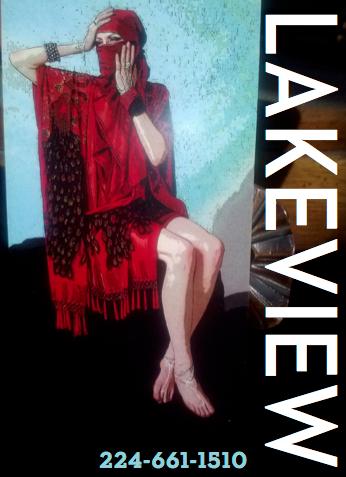
it was not a top ten year), I’m sheltering with my parents. Long story short, I’m 100 percent financially dependent on my parents right now. The upside is, I’ve had a lot of time to become comfortable with the fact that I really, really want to mess around with crossdressing. I would love to get a binder and a masc getup and haircut and just see how that feels. My parents will want to know “what this means” and they won’t take “fuck if I know” for an answer. It will be a long time (maybe years) before I’m either eligible for disability or ready to work again, and I just can’t wait that long. So much of my life has already passed me by and I’m tired of waiting for a “right time.” But binders and clothes and haircuts cost money. Keeping masc stuff around the house means people will eventually see it. Again, they’d probably be supportive, but I just want to keep this private. Is there a way to do it?
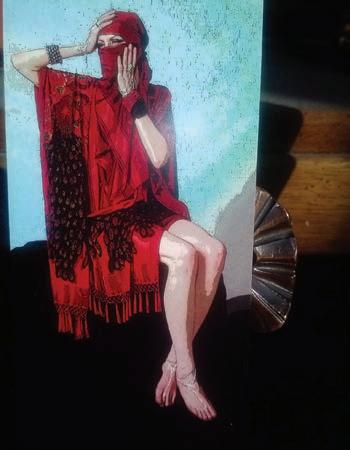
—HOPING FOR A THIRD OPTION

A: Other than winning the lottery and moving out on your own tomorrow, HFATO, there’s no third option here. You’re going to have to pick your poison: risk having an awkward conversation with parents who are likely to be supportive or continue to wait—possibly for years— before you start exploring your gender presentation. The choice seems obvious to me.
Q: Got in an argument recently about pegging and its original definition: “a woman fucking a man in the ass with a strap-on dildo.”
I feel it’s moved beyond that and now means anyone wearing a strap-on fucking anyone else in the ass. My friends insisted that only a man can be pegged, and only by a woman. As the originator of the term, Dan, we turn to you: Can a woman
OPINION
peg another woman? —A NEW ASS LICKER
A: I will allow it.
Q: Are some people just bad at sex? My partner has been overwhelmed with work and our sex life suffered a major decline. He’s working with a psychotherapist who told him some people are just not good at sex and he should just accept that he’s one of those people. It broke my heart to know someone said that to my partner. Am I overreacting? Is there some way to take this as anything but wrong? Or is this therapist a clown?
—COMPLETELY UNDERMINING NEGATIVE THERAPY
A: There are people out there who are “bad at sex” by objective measures.



There has to be. But “good sex” is so subjective that I’m not convinced objective measures really matter. For example, I got a letter yesterday from someone complaining their partner is “bad at sex” because they just lie there, silent and inert, while the letter writer “does all the work.” But if the person who just lies there was partnered with a necrophiliac, well, that “silent and inert” stuff would make them great at sex, not bad at sex, at least by a necrophiliac’s standards.
As for your boyfriend, CUNT, you’re in a better position to judge whether he’s good at sex—by your subjective standards—than his shrink. Presumably. And
if you enjoyed the sex you were having before your partner was overwhelmed with work, then he’s good at sex—he’s good at sex by your standards—and here’s hoping you get back to having lots of good sex together soon. v


Send letters to mail@ savagelove.net. Download the Savage Lovecast at savagelovecast.com.
@fakedansavage
MAY 28. 2020 - CHICAGO READER 37
JOE NEWTON LD Rates Apply 18+(726-8437) (242-8669) 726-8437 242-8669 GetYourSwag! www.chicagoreader.com/shop LAKEVIEW
CLASSIFIEDS






JOBS
Guaranteed Rate Inc. seeks Systems Engineers for Chicago, IL to design, deploy, maintain, & support a full stack of Atlassian tools in server, cloud, & data center implementations. Bachelor’s in Comp Sci +5yrs exp req’d. Req’d Skills: 5yrs exp: Enterprise scaling of Atlassian Tools; admin, dev, installation & deployment of Jira, Jira service desk & confluence; writing custom Jira APIs; upgrade & create custom plugins. Exp must include: Artifactory; Jenkins; working in financial/banking domain. Background Check req’d. Send resume to: https:// careers.rate.com/, Ref: SV

TransUnion, LLC seeks Lead Developers for Chicago, IL location to independently design & dev sw apps. Master’s in Comp Sci/Comp Eng/any Eng field+2yrs exp OR Bachelor’s in Comp Sci/Comp Eng/ any Eng field+ 5yrs exp req’d. Req’d Skills: Tableau Desktop & Server, AbInitio GDE , Express>IT (ACE & BRE), Control Center, Jasper, Hyperion IR, Unix/Linux, Shell scripting, Python, VBA Macro, Core Java, JSON, XML, Agile, CI/ CD, Jenkins, Dremio,



Hive, Oracle, Sybase, SQL Developer, Autosys. Send resume to: R. Harvey, REF: JS, 555 W Adams, Chicago, IL 60661






TransUnion, LLC seeks Lead Engineers for Chicago, IL location to enable new sw app features & optimize strategic solutions. Master’s in Comp Sci/ Comp Apps/Comp Info Systems/Comp Eng/ any Eng field +3yrs exp OR Bachelor’s in Comp Sci/Comp Apps/ Comp Info Systems/ Comp Eng/any Eng field + 5yrs exp req’d. Req’d Skills: sw design exp w/APIs, Unix, Linux, Informix, PostgreSQL, DB2, Oracle, Python, Web Services in C & C++, Java, SOAP, JSON, Cassandra, Google Protocol Buffer, Shell Scripting, GIT, Mercurial, Artifactory, Maven, UML, Match Algorithm Design. 20% telecommuting permitted. Send resume to: R. Harvey, REF: LM, 555 W Adams, Chicago, IL 60661
Pragma Edge Inc seeks Master’s + 1 yr. exp/equiv.: Sterling Integrator Programmer









I (PSIPI19). Sterling B2B Integrator, SEAS, IBM Control Center, IBM Sterling Secure Proxy, IBM PEM, C#, ASP.NET, ADO.Net, VBScript, JSON, JavaScript, REST, SOAP.Mail resume with job ID # to


HR:500 Lake Cook Rd, Suite 350, Deerfield, IL 60015. Unanticipated work site locations throughout U.S. Foreign equiv. accepted.




Test Engineer, Brighton Solutions Inc, Schaumburg, IL. Develop test plans. Provide vendor & field personnel support. Troubleshoot UE issues. Develop test scenarios to provide UE KPI test procedures & results. Reqs: Bach in Info & Comm Eng, Comp Sci or related, or foreign equiv, +5 yrs progressive exp in development of test plans in mobile industry. Exp must include use of QXDM, Bugzilla, Wireshark & Jira, LTE & Android tech. Various unanticipated U.S. job locations per client assignment. Details at https://brighton. solutions/. Send resume to kurt@brighton. solutions.
MARKETPLACE ADULT SERVICES


Danielle’s Lip Service, Erotic Phone Chat. 24/7. Must be 21+. Credit/Debit Cards Accepted. All Fetishes and Fantasies Are Welcomed. Personal, Private and Discrete. 773-935-4995

38 CHICAGO READER - MAY 28, 2020 ll
JOBS ADMINISTRATIVE SALES & MARKETING FOOD & DRINK SPAS & SALONS BIKE JOBS GENERAL REAL ESTATE RENTALS FOR SALE NON-RESIDENTIAL ROOMATES MARKETPLACE GOODS SERVICES HEALTH & WELLNESS INSTRUCTION MUSIC & ARTS NOTICES MESSAGES LEGAL NOTICES ADULT SERVICES
WANT TO ADD A LISTING TO OUR CLASSIFIEDS? E-mail classified-ads@chicagoreader.com with details or call (312) 392-2970 TIRED OF DATING APPS? Meet people the old-school way. FREE at chicagoreader.com/matches the cannabis platform a Reader resource for the canna curious nuMed.com | 1308 W. North Ave Chicago’s friendliest cannabis shop Thursdays on Cannabis Conversations chicagoreader.com/joravsky Cannabis Conversations chicagoreader.com/ joravsky To advertise, call 312-392-2934 or email ads@chicagoreader.com www.neuromedici.com 312-772-2313 Findouttoday ifmedical cannabisorinfusiontherapyis rightforyou.Telemedavailable! Yourpartnersinhealthandwellness. Serving medical cannabis patients since 2015. An Essential Calm. Day or Night. Whole-plant hemp formulations for peace of mind and body. mineralhealth.co GETINVOLVED! chicagoreader.com/420book The Reader 420 Companion is filled with great recipes, activities and coloring pages Your purchase supports the Reader. 15% of the proceeds will be donated to the Chicago Coalition for the Homeless.







































MAY 28, 2020 - CHICAGO READER 39 FINANCING AVAILABLE Licensed, Bonded & Insured—IL Roofing Lic. #104.013526 For 40 years, 30,000+ satisfied customers have trusted Second City. • ROOFING • BRICKWORK • GARAGES SHINGLE ROOFS NEW GARAGESFLAT ROOFS ROOFING, GUTTERS & MORE the platform The Chicago Reader Guide to Business and Professional Services www.herreralandscapes.com llllllllllllllllllllllllllllllllllllllllllllllllllllllllllllllllllWe bring your outdoor vision to life! DISCOVER YOUR BLISS www.intimate-bliss.com *WARNING: Must be 18 years or older to visit website and/or place order. To advertise, call 312-392-2934 or email ads@chicagoreader.com SAVE BIG ON A NEW HVAC SYSTEM FINANCING AVAILABLE CREDIT CARS ACCEPTED Up to $2,500 savings for a limited time! Call today for a free estimate! 773-895-2797 | www.MironHVAC.com -Energy Efficient -Innovative comfort features -Great maintenance contracts -24-Hr Emergency Service Psychic ReadingsPalm and Tarot If you are worried, troubled, sick or unhappy through love, business, marriage, luck or whatever your problem may be, I have reunited the separated, healed the sick and help many people with money problems. Whereothershavefailed.Ihave succeeded. I will not ask what you came in for. I will tell you. (773)-540-5037 1222 E 47th St She guarantees to help you. No problem is too big for her COLLABO TIVE PREMARITAL FAMILY DIVORCE MEDIATION Brigi e Schmidt Bell, P.C. Phone and Video Consultations. Call today. BrigitteBell.com Lawyers@bsbpc.com 312-360-1124 travel home improvement psychic real estate advertising books romance legalfuneral services entertainment American Owned American Made We Offer Quality Affordable • At Need Funeral Services • Pre-Planned Funeral Services • Traditional Funeral/Cremation Services • Direct Cremation/Direct Burial • Memorial Services • Specializing in Veterans Services 773-956-4000 5112 S. Western Ave | Chicago, IL 60609 “Let all that you do be done in love” - 1 Cor 16:14 www.GraceAndMercyFS.biz Serving Chicagoland and NW Indiana YOUR AD HERE
crisis. In response, we teamed up with the city’s best
een percent of the

go to the Comp Tab Relief

during this
give you their stay-at-home
to provide financial assistance to any and all service workers who need it.
a project
: Chicago Cooks at Home and drinks! ^ $30 PDF download I $55 printed copy + PDF chicagoreader.com/recipebook The Chicago Reader, like so many food and beverage professionals, is facing a devastating blow to our finances
COVID-19
chefs and bartenders to
staples. Fi
profits will
Fund,
created




























 —CULTURE EDITOR BRIANNA WELLEN
—CULTURE EDITOR BRIANNA WELLEN



 By MIKE SULA
By MIKE SULA























































































 @BriannaWellen
@BriannaWellen




















































 By DEANNA ISAACS
By DEANNA ISAACS





















































































































 —LEOR GALIL
—LEOR GALIL




















































































































